#this thing is technically a first draft so it is subject to edits at any time
Text
Hey, look, it's this thing again, only with a whole new chapter!
Oh, but what's that? It's not ten thousand words like I said it would be? You are absolutely correct! It is now just shy of eight thousand, because I had to split it apart from what was on track to become fifteen thousand.
There's some worldbuilding in this new chapter, Oh Boy!
Also, trigger warning, Shio exists <:)
If you like this at all, go thank @anightydragon for making me want to write more of it~ OuO
(Psst, @crinklytinfoil, stupid squishboi alert)
#among us#i FUCKING GUESS#but really only tangentially XD#breach#original writing#shio is such a fucking dick and i both love and hate them for it#for being the main character qing sure doesn't get to show up much in this chapter or most of the next LMAO#red is so fucking tired you guys#NSFA#this thing is technically a first draft so it is subject to edits at any time#and those edits could potentially be massive LOL#i'm not adding content warnings on this post so read at your own risk#i wouldn't classify it as Dead Dove myself#but it's definitely going to trend close in a few places#especially later on
6 notes
·
View notes
Text
My attempt to introduce Bristlecone:
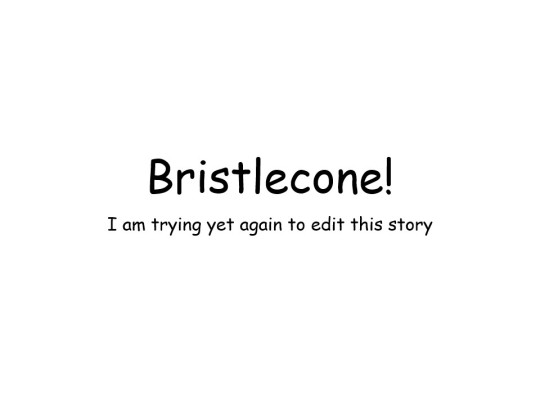




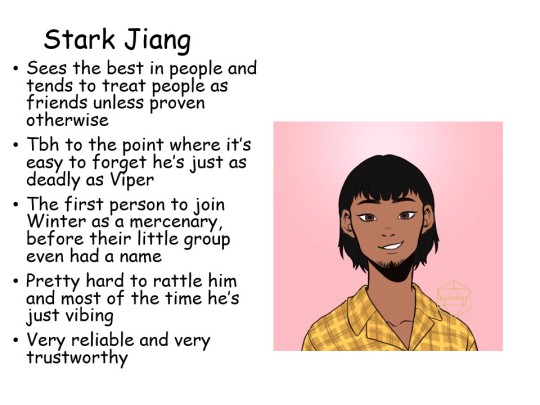


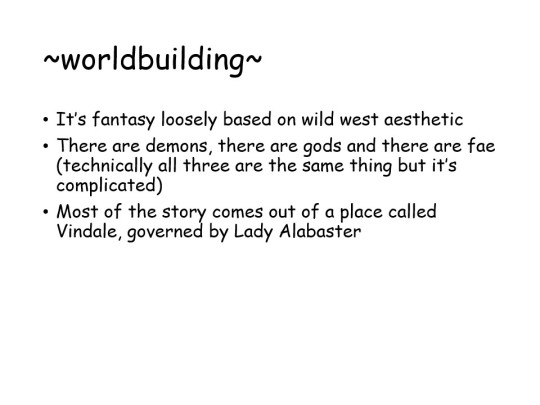
Details subject to change without notice as I think of better ideas lol
Tagging @concealeddarkness13 since they said they were curious!
Text version under the cut:
Slide one: Bristlecone!
I am trying yet again to edit this story
Slide two: ... Bristlecone?
An older wip (finished last draft back in 2018)
Not sure if I’ll keep the title Bristlecone but I don’t have any better ideas either
I’m finally getting back to it (hopefully)
It’s editing/revising time now
Setting – fantasy with wild west inspiration (simply because I thought it would be neat)
Kind of a murder mystery, kind of a general mystery, kind of an adventure
Which means one of these characters could be the culprit… Or not… It’s a mystery…
Slide three: Viper (one of the POV characters)
That’s not her real name
Deputy of the Aristata and unofficially Winter’s girlfriend (They act as more than just working partners but neither has said anything to each other to acknowledge this)
Observant but tends to ignore her gut feelings
Loves horses, and is in charge of training them
Is unable to speak to people she doesn't know, and then can only manage a whisper
Has had a rough decade or so before joining the Aristata to say the least
Slide four: Honey Davis (the other POV character)
That’s not his real name
Was training to take Cecil’s place as a Mortician Mage until recent events stopped that
Newly recruited as a mercenary to the Aristata
He has some… Secrets (some of which he himself doesn’t even know)
Orphaned as a child when his parents were executed (for good reason)
Something off about him. Eyes shine at night like a cat.
Kind, gentle, and would have made a very good Mortician Mage
Slide five: Winter Balfouriana
This is her real name!
Leader and founder of the Aristata
Viper’s girlfriend
Last surviving member of fairly powerful/noble family of demon slayers
Prior to the “disaster” which killed her family, her mother had trained her in enchanted metalsmithing
Tenacious and strategic, and genuinely cares for her mercenaries
Respectful and fair
Slide six: Stark Jiang
Sees the best in people and tends to treat people as friends unless proven otherwise
Tbh to the point where it’s easy to forget he’s just as deadly as Viper
The first person to join Winter as a mercenary, before their little group even had a name
Pretty hard to rattle him and most of the time he’s just vibing
Very reliable and very trustworthy
Slide seven: Other people
Cecil Davis – Wayton’s Mortician Mage and the man who took in Honey after he was orphaned
Taiga – Cecil’s weird dog
Lady Alabaster – Countess of Vindale. She hired the Aristata to settle a conflict with a neighbouring Lord
Ren Alabaster – Lady Alabaster’s son (he’s gone missing)
Annie and Theo – The other two members of the Aristata
Slide eight: Stuff that's going on
Basically, Lady Alabaster’s son goes missing in the middle of the night
That same night Winter finds Honey alone in desert
The Aristata agree to stay under Lady Alabaster’s employment to try and find her son
So what happened to Ren Alabaster?
Is he even still alive?
What’s the deal with this Honey kid?
Could it perhaps be an issue that Viper doesn’t like to accept what she knows to be true and instead deny to avoid recognizing uncomfortable truths?
Who knows, could be anything!
Slide nine: ~worldbuilding~
It’s fantasy loosely based on wild west aesthetic
There are demons, there are gods and there are fae (technically all three are the same thing but it’s complicated)
Most of the story comes out of a place called Vindale, governed by Lady Alabaster
#wip intro#bristlecone#viper (character)#honey (character)#Winter (character)#stark (character)#trying to add character to the tags as to not get mixed up with actual snake posts or honey etc...
13 notes
·
View notes
Note
30, 50, 70?
30. How much do you edit your fics? Do you edit as you write or wait until you finish the first draft?
Lots. My first drafts come out more like free-verse poetry than fiction with lots of summary and would be very unsatisfying to read. I edit both as I write and go through the whole thing before I post. When I edit as I write, it's more of a looping edit, if that makes any sense.
I'll be filling in the gaps in the free-verse brain-spew to make it coherent, get to a point where it sure would have been cool if there was a cast-iron frying pan, go back, add in the frying pan, read through to where I was and, in doing so, realize I once again screwed up how many people the Drifter shot and have to stop, do some math, go back and increase a number, read back down and realize that Eris cannot wield a sword and a hand canon and her frozen Ahamkara bone and pick up the Drifter's rifle with only two hands, loop back up and edit that, read back through and get down to the point where they're running through a hallway and realize I said ground, like dirt, and the floor is metal, loop back up and fix that, read back down and write "she answered" only to realize she has "answered" four times in the same small chunk of text, figure out which of the four "answered"s I'm keeping and come up with different phrasing and/or actions to take in place of phrasing for the other three, realize that one of those actions, while cool, should have a reaction from someone else, loop down and add that in, read through that again only to find that we can't still be talking when we're on opposite ends of the complex and we said we were keeping the communicators set to 20 feet, highlight a chunk of text, cut it, paste it at the bottom of the page below where I'm writing, go back and rewrite my way out of the logistical corner I painted myself into, and then try to figure out how to weave what I chopped out back into the narrative without getting them more than 20 feet from each other and/or without them being able to talk back and forth across the comms that can't go beyond 20 feet… wash, rinse, repeat…
50. How would you describe your writing style?
My fanfiction output is driven by my passionate undying love of two specific characters in one videogame. I either stick them in my head and let them talk to each other, or come up with a situation that would provide them lots of opportunity to talk their way through a situation, or I come up with cool badass things they might do in a fight and figure out how to get them into that fight. This results in very dialogue-driven stories and/or plots designed to frame a particular moment of badassery in the hopes that it will be epic enough to linger in someone's brain the way it has haunted mine.
If we're talking from a technical perspective, I love subjective first person narration passionately, but I also love the 3rd person perspective we get in-game, so I try to balance that by keeping it in 3rd person semi-omniscient but allowing characters to tell their own stories verbally as much as possible, only slipping into internal thoughts when I feel like it's needed from a logistical standpoint.
70. Are you subscribed to any writers on AO3?
Yes, and you are one of them, @synnthamonsugar. <3 My subscription count is currently at 23. Not all of the subscriptions are to writers (some are to individual works I especially want to keep track of in case they are updated), but most of them are writers. I collect anyone who writes Drifter or Eris in a way that pleases me and I keep them like a treasure hoard, rushing off in glee to read when they post and delighting in their things. I am always on the lookout for more delicious stories, though, so while I do comb through the search fairly regularly looking for new shinies, if you have recommendations, I would love to hear them.
1 note
·
View note
Text
HOW TO WRITE A GOOD BLOG?
Here's a step-by-step guide to help you write a successful blog post:
Choose a Topic: Select a topic that interests you and your target audience. Research trending topics, keywords, and consider your expertise in the subject matter.
Keyword Research: Identify relevant keywords for your topic. Tools like Google Keyword Planner or Ahrefs can help you find popular keywords related to your topic. Incorporate these keywords naturally throughout your post.
Define Your Target Audience: Understand who your readers are and what they are looking for. Tailor your content to meet their needs and preferences.
Create an Outline: Plan the structure of your blog post. This typically includes an introduction, several main points or sections, and a conclusion. Outlining helps you stay organized and ensures a logical flow of information.
Write a Captivating Title: Your title should be attention-grabbing, relevant to the topic, and include a keyword. It's the first thing readers see, so make it compelling.
Write a Strong Introduction: Start your post with a hook that piques the reader's interest. Clearly state the purpose of the blog post and what readers can expect to learn.
Develop the Body: Each section should address a specific point or sub-topic. Use clear headings and subheadings to break up content. Support your points with data, examples, and relevant information. Ensure a smooth transition between sections.
Incorporate Visuals: Add images, infographics, videos, or other multimedia elements to make your content more engaging. Ensure that these visuals are relevant to the topic and enhance the reader's understanding.
Cite Sources: If you use statistics, quotes, or information from other sources, provide proper citations. This adds credibility to your post and helps readers find more information.
Maintain Consistent Style: Use a consistent writing style, tone, and voice throughout your blog post. Avoid jargon or overly technical language unless your target audience is familiar with it.
Edit and Proofread: After completing the first draft, take the time to edit and proofread your blog post. Check for grammar, spelling, and punctuation errors. Ensure that your content is clear and concise.
Optimize for SEO: Optimize your blog post for search engines by incorporating relevant keywords, meta descriptions, and alt tags for images. Use header tags (H1, H2, H3) to structure your content.
Add Call to Action (CTA): Encourage reader engagement by adding a clear CTA. This could be asking for comments, sharing the post on social media, or subscribing to your blog.
Formatting: Use short paragraphs, bullet points, and numbered lists to make your content scannable. This helps readers find the information they're looking for quickly.
Mobile Responsiveness: Ensure that your blog post is readable and visually appealing on both desktop and mobile devices.
Meta Description: Write a concise and compelling meta description for your blog post. This is what appears in search engine results and can influence whether someone clicks on your post.
Publish and Promote: Once you're satisfied with your blog post, publish it on your website or blog platform. Share it on social media, through email newsletters, and any other relevant channels to increase its reach. For exp

Engage with Comments: Respond to comments and engage with your readers. Building a community around your blog can help grow your audience.
Remember that writing is a skill that improves with practice. Continuously learn from reader feedback and adapt your writing style to better serve your audience. Over time, you'll become a more effective and engaging blogger.
0 notes
Text
SAILING THROUGH YOUR PHD THESIS: WRITING TIPS

Acquiring a doctorate is a cumbersome process, with the ultimate stage being the creation of systematic research write up describing your study: your thesis. While writing a thesis, attention to detail, technical knowledge, and narrative abilities are all necessary qualities. After years of hard work and efforts, most PhDs students write their thesis in frenzy in the last months of a program.
The good news is that you can amplify your odds by taking a few actions and utilizing the tips listed below:
1. Clarity is essential
Consider your writing carefully and draft your initial thoughts, then step away from it for a while before returning to it with a degree of scepticism. Examine the report critically and attentively for the style and logic behind it. It's essential to look for hanging modifiers, subject-verb contradiction, and inconsistency, among other things. If you feel you're too engrossed in writing, it is better to step back and instead have a friend review it for you.
2. When quoting, be cautious
Writing a thesis involves massive research from various sources, so be cautious when citing other sources. When gathering quotes for your thesis, make sure to note whether the italicized emphasis is there in the original and take detailed notes. Transcribe them precisely to save time later and guarantee adherence to your source. Another vital tip when quoting sources is preserving the original spellings, even if they vary from your preferred style.
3. Use your thesis to represent yourself
Keep in mind that your thesis is your opportunity to portray your work in the best light imaginable. Think about your first few paragraphs, how you may lure the reader with your writing and most importantly, be precise about your hypothesis and conclusion. Insert material only where it adds value to your work, not just bulk up the length of your paper. Keep your reader in mind; this is an excellent tip if individuals wish to participate in a doctoral thesis competition as it is a perfect opportunity to highlight your work.
4. Set a date for submitting your thesis or dissertation
While your university may establish a thesis submission date depending on your academics, in some cases, you can set yourself a fictitious deadline. On the other hand, professors allow students to do additional research or defer revisions for more important reasons. Give yourself a deadline for completing your application to avoid rework or re-submission issues.
5. Review your thesis before submitting it
Always proofread your work for spelling errors, poor sentence structure, and incorrect scientific terminology. Reviewing your material will also assist you in generating ideas for the following part or chapter and determining what to write about next.
If you concentrate on fast victories, you may create more quickly and eliminate some of the procrastination involved with writing. Finally, depending on how busy your colleagues or friends are or how long it takes them to read your chapters, the review procedure might take weeks to complete. Submit your chapters to them or your supervisors regularly for editing and evaluation.
When you follow these simple but highly effective writing tips for your Ph.D. thesis, you are bound to sail through your chosen Ph.D. program without any hurdles. To present your work to spectators, visit our website for more information and participate in EDAMBAs doctoral thesis competition 2022 today.
0 notes
Text
Guide to Story Researching
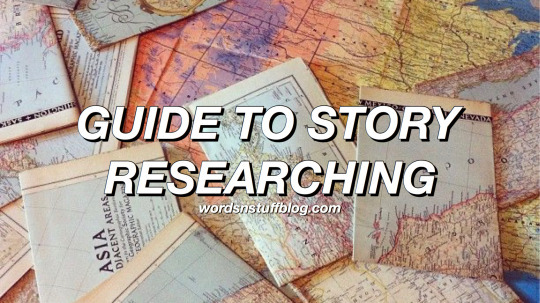
PLEASE REBLOG | Tumblr suppresses posts with links :/
Patreon || Ko-Fi || Masterlist || Work In Progress
–
Start With Broad Subjects
When you begin a story that is heavy with technical detail that must be checked for accuracy, the most efficient way of going about it is approaching the first draft with a general sense of the topic. Then, as you write more and more, keep note of details you don’t have or facts you need to find. When you reach the second and third drafts, turn that general idea into specific detail. You’ll know what you need to know at that point, and you won’t waste valuable time doing unnecessary research instead of revising.
Keep Track of Your Resources
Hoard. Your. Sources. Not only so you can cite them to any editors or beta-readers whose knowledge may conflict with what you’ve researched, but so you can refer back to them if you decide to elaborate on the part of the story that required that information in the first place. Always keep a list of links in a document with the specific information you’ve gleaned from it, listed in a way where you can easily navigate and revisit sources and information.
Hold Credible Sources Close
If you find something credible and easily navigable, covet it. When you’re researching very niche or specific topics and you find a gem of a resource that is verifiably correct and easy to understand and use for your purposes, it’s very important that you get everything you can out of it. A lot of resources on things you’ll have to do extensive research on are behind a paywall or incredibly dense.
Know When to Google vs. Ask Someone
My general rule is this: if it’s an indisputable fact that is fairly straightforward, google it. If it’s a matter of objective fact, google it. If it is an experience or a matter of opinion/perspective, ask someone or find a primary source. If it’s a matter of emotion or subjectivity, ask someone about their experience or their perspective on the issue.
Examples of what to Google:
What year did the Hindenburg Blimp crash?
How many people died of the plague?
What was Led Zeppelin’s most lucrative studio album?
Examples of what to ask a qualified individual about:
What does gender dysphoria feel like? *
What was the public sentiment around the Havana Mob in the 1950s?
How does sexual abuse impact male victims? *
* - When researching these things, it’s recommended to obtain multiple accounts and perspectives and maintain sensitivity
First Draft = Main Idea, Second Draft = Specificities
As I said before, the easiest way to ensure accuracy takes a front seat in your final product is to accomplish it in stages. The first draft should include basic ideas that provide a general sense of the topic. The second draft is where you should begin deeper research into more specific topics based on what you actually included in the story.
Common Struggles
~ How do I research linguistics of differing time periods?... Researching specifics like this require specialized resources. I would go about it by finding general resources and then delving deeper into the sources they cite within the text. For instance, wikipedia is a general resource, but the citations at the bottom usually lead to a variety of niche resources on the topic, and you’ll probably find what you’re looking for in them instead.
~ Where do I find credible medical information?... Put simply, doctors. Seriously. There’s a giant community of medical blogs and journals where doctors break medical information down for the general public’s understanding, and they usually cite recent and up-to-date medical studies and practices. Don’t start with WebMD, start with things like MayoClinic.org and through there, find their medical publications like PubMed, which has millions of citations for biomedical literature.
~ Where do I begin deciding what I need to research?... You’ll learn what you don’t know when you actually write your draft and find the holes in your information. I recommend keeping notes of where you’re like “um, I don’t know what year that was” or “I have no clue how to describe what this feels like”.
~ When should I stop researching?... Stop researching when the detail starts to eclipse the practical application to your story. Remember that the purpose of your research is not to give your reader a lecture, but to accurately portray whatever it may be in order to allow the reader to suspend their disbelief and become immersed in the plot.
~ How do I determine which information will integrate naturally?... Once you comb through your draft, you’ll find suitable places to slip facts and accuracies into the narrative. If you spend paragraphs writing a report on so-and-so, it’s not mixing in well enough and you’re probably including a lot of unnecessary detail. Research is meant to be sprinkled in gradually and mixed into the plot as you go along. It’s not to write a dense forward to stave off the “fact-checking trolls”.
Other Resources
Useful Writing Resources | Part II
Resources For Writing Sketchy Topics
Where To Start Researching For Stories
Resources For Writing Royalty
Resources For Writing The Mafia
Editing & Proofreading Cheat Sheet
What To Change Draft-By-Draft
Finding And Fixing Plot Holes
Resources For Romance Writers
Resources For Writing YA Fiction/Romance
Resources For Writing (Global) Period Pieces : High Middle Ages & Renaissance
Resources For Writing (Global) Period Pieces : 1600s
Resources For Writing (Global) Period Pieces : 1700s
Resources For Writing (Global) Period Pieces : 1800s
Resources For Writing (Global) Period Pieces : 1900-1939
Resources For Writing (Global) Period Pieces : 1940-1969
Resources For Writing (Global) Period Pieces : 1970-1999
World Building In Historical Fiction
Writing Other Eras
Historically Accurate Dialogue
Accuracy vs Relatability
Guide To Writing Historical Fiction | Part II
Resources For Writing Science Fiction
Resources For Writing Dystopian/Post-Apocalyptic Stories
Resources For Fantasy/Mythology Writers
Resources For Crime/Mystery/Thriller Writers
–
Masterlist | WIP Blog
If you enjoy my blog and wish for it to continue being updated frequently and for me to continue putting my energy toward answering your questions, please consider Buying Me A Coffee, or pledging your support on Patreon, where I offer early access and exclusive benefits for only $5/month.
Shoutout to my $15+ patrons, Jade Ashley and Douglas S.!
#writing#writeblr#writespo#writing resources#writing tips#writing advice#writing help#writing inspiration#motivation
2K notes
·
View notes
Text
Linguistics Jobs: Interview with a Technical Writer
One thing I love about the Linguistics Jobs interview series is that each interview has relevant information about a specific job, but also lots of wonderful general advice about looking for work. Today, I really appreciate Alex Katz’s insight into the importance of building up a portfolio of work that you can share with potential future employers. Trying your hand at technical writing, or audio production or any other job you think you might be interested in, is a great way to see if it suits, and have something to show potential future employers. You can follow Alex on Twitter (@WizardOfDocs) and they’re also on Mastodon ([email protected]).
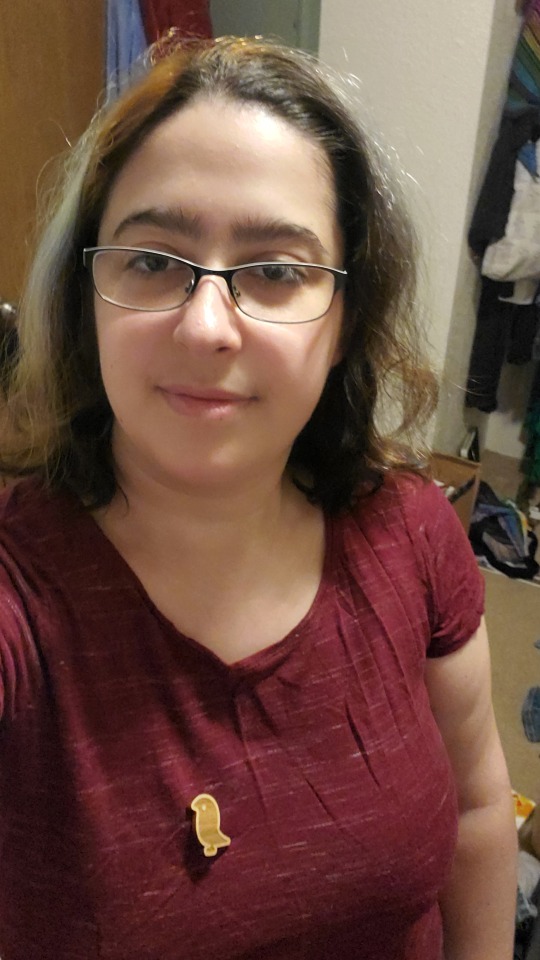
What did you study at university?
For my bachelor's I did a double linguistics and Chinese literature major, and an honors thesis about how characters in old Doctor Who stories address each other. Then I did a Master of Arts degree in linguistics, focusing on pragmatics, and my thesis took John Searle's speech act theory and Brown & Levinson's politeness theory and combined them into a new set of speech act categories.
The idea for my master's thesis came from reading Searle's original paper in my discourse analysis class and thinking "I can do this better." So I wrote a paper about it for the class, and that turned into the first draft of my thesis. So don't prevent yourself from doing something if the only reason you want to do it is to do it better than someone else. It gets results.
What is your job?
I'm a contract technical writer for a shopping website. My day-to-day work is improving the documentation of how to use/add to the code that keeps the website running: I'm editing the existing documentation one page at a time, but I'm also taking edit requests and proposals for new pages, and even planning a major restructuring of my team's internal website to make sure our customers can learn what to do better.
How does your linguistics training help you in your job?
Studying linguistics, and especially pragmatics, has made me a better writer and a better editor. I can figure out why a particular phrasing or formatting decision is better or worse in context, and explain it to my teammates. That skill isn't just useful for the actual documentation--understanding pragmatics also helps me write emails and Slack messages to make sure members of my team are talking to each other and can give me the information I need.
Do you have any advice you wish someone had given to you about linguistics/careers/university?
If you want to get into technical writing, start building up your portfolio as soon as possible, especially in your chosen subject area. Ask your professors if they have syllabi or lab procedures that need updating. Start a blog. Document open-source projects. I didn't realize I wanted to be a technical writer until a couple of years after I graduated, and now all my best work is proprietary and I can't work on open source projects without jumping through lots of hoops. So I'm feeling kind of stuck. If I'd realized sooner that I could just (for example) send the developer of a Minecraft mod a pull request to improve their in-game tutorial book, my portfolio would look a lot better.
Also, expect to spend at least a few years as a contractor before any company decides you're worth hiring for real. That means a lot of short-term jobs, and probably some bad employers at the staffing agencies. But it's a good way to figure out what kind of company you really want to work for, and a great way to build up your resume--even if I don't get to go full-time at this job, I can now say I've worked at three different big tech companies.
Any other thoughts or comments?
It's not exaggerating to say studying linguistics has made me a better person. I was diagnosed with an autism spectrum disorder in college, just as I was starting to study linguistics, and those things together gave me a wonderful opportunity to study how people talk to each other and learn how to present myself as someone people want to spend time with.
Related interviews:
Interview with a Standards Engineer
Interview with a Product Manager
Interview with an Editor and Copywriter
Recent interview:
Interview with a Stay-at-home Mom and Twitch Streamer
Interview with a Peer Review Program Manager
Interview with an Associate at the Children’s Center for Communication, Beverly School for the Deaf
Interview with a Metadata Specialist and Genealogist
Interview with a Developer Advocate
Check out the full Linguist Jobs Interview List and the Linguist Jobs tag for even more interviews
240 notes
·
View notes
Text
What is an Alpha Reader?
Stories don’t exist without writers - that much is a given. But the best stories are never a solo effort, even if they have only a single author. Other people will contribute, in big ways and small, and potentially fill many roles to help the author see the work through to completion. Three of the most prominent of these roles are:
Alpha readers
Editors
Beta readers
Each does something different, but often in fandom-based writing spaces they’re used interchangeably in ways that can lead to confusion and a mismatch of expectation and performance between the author and the person helping them. As such, Duck Prints Press will be doing a series of three posts over the next few weeks that discusses each of these roles in detail. The purpose of these posts is
to provide a definition of each role (alpha, editor, and beta)
list examples of services a person in each role might provide for an author,
provide insight into some appropriate ways for an author to interact with their helper, and
to suggest some points that an author and their selected feedback provider should discuss before the alpha/editor/beta begins work, to ensure that both individuals have a positive experience and that the helper is providing the kind of information that the author is seeking.
Two things of note before we proceed:
There is no single definition of these terms. We’re not claiming to be an authority or to say, “these are the correct definitions and all others are invalid.” Instead, our goal with these posts is to provide a common framework to help authors and individuals interested in helping them communicate about the nature of the roles to be undertaken, and to give information to help both writers and people who want to help writers understand what help is desired and how they can support each other.
If an author hasn’t said “I’m looking for an alpha/editor/beta,” then it doesn’t matter what form of feedback you provide - unsolicited alphaing, editing or betaing is generally unwelcome and often unhelpful. Yes, some authors DO like and appreciate it. However, most don’t. Never use these posts as, “now that I know what alphaing is, I’ve read your story and now I’m alphaing for you!” That’s not how this works. Alphaing, betaing, and editing are always collaborative, undertaken between an author and feedback provider that they’ve entrusted to help them. If you’d like to give feedback to an author about something of theirs you’ve read...ask them if they want it! And respect their response! It’s really, truly that simple.
What is an Alpha Reader?
Alpha readers are generally one of the first “outsiders” brought in to support an author, and, depending on how the author approaches their process, may be sought before the story has been written. The primary roles of an alpha reader are to brainstorm with an author, flesh out the plot, fill plot holes, solve conundrums and issues that arise, and help the author get their vision of the story put down in concrete words. Alpha readers may be recruited short term, to help an author work through a specific issue, or they may accompany the author from conceptual inception through the entire first draft or beyond - some may even end up credited as co-authors, depending on how many ideas they end up contributing! In fandom spaces especially, alphas are often described as cheerleaders, and in many cases, they are explicitly asked not to provide extensive criticism and editing - alphas work with the understanding that they have been brought in to help an author complete a first draft, and so the issues they help with are those more relevant to a work at an early stage of development.
Many people short-hand alphas by jokingly refer to them as “rubber duck debuggers,” inspired by the habit many computer programmers have of talking out a problem to an inanimate object until they figure out the solution. The idea is that alpha readers often don’t have to do anything - they just have to listen to the author until the author figures out the solution themselves! Sometimes, that’s truly all that an alpha will need to do, but don’t assume that’s all an alpha will do, and don’t play down the critical role that many alphas have played in the development of stories by giving timely, insightful feedback. An alpha can be invaluable in solving issues, seeing through thorny challenges, resolving points of uncertainty and confusion, and providing the author with the motivation, support and encouragement they need to see a first draft through to the end. Alphas are great, and are definitely not interchangeable with a rubber duck (however much we at Duck Prints Press love our rubber ducks).
Services/Responsibilities/Activities Associated with Alpha Reading:
Meet with the author to establish the scope of help the author would like. This post includes a thorough list of tasks often undertaken by an alpha reader, but it’s unlikely that an alpha reader will do all of these tasks.
Listen to and incorporate world building and character information provided by the author, and work to provide feedback that fits with what they’ve established.
Read an author’s notes or outlines to get a general idea of what the author is trying to accomplish
Discuss story elements with the author to whatever degree of detail and specificity the author requests.
Offer insight and ideas to help solve problems that the author approaches you about, within the scope of what the author has said they’re willing to change or modify about their story.
Cheerlead, praise, and support the author as they write their first draft.
Indicate sentences, passages, and/or chapters that work especially well, and those that lacked adequate explication for the alpha to understand what took place.
Point out issues with representation, areas where the author might need to do more research, use of racist or sexist tropes, and other aspects of the story that may be problematic. (Please remember to be careful of the difference between “this story contains problematic elements” and “this author is problematic.” Many authors intentionally playing with these elements. Also remember that alphas are not the same as sensitivity readers!)
Make sure to offer feedback on what is good and what you like!!
If given a full first draft manuscript to review, post-reading you may be given a list of questions the author would like you to answer, indicating specific areas that the author would like more information about and/or help with.
Very rarely, an author may ask for an alpha to edit for grammar, structure, word choice, and other technical elements. However, in “standard” definitions of alpha reading, these roles would be excluded.
Be honest and objective! Don’t say something is good if you don’t think it is, and don’t say something is bad just because you didn’t like it.
Understand that an author is never obligated to take an alpha’s advice!
Services/Responsibilities/Activities Associated with being an Author Working with an Alpha Reader:
Have a clear idea of what an alpha reader will be asked to do before recruiting one - ideally, any request for an alpha should include this information! Don’t just say, “I’m looking for an alpha reader” and assume that anyone who responds will understand that to mean the same thing as you do. Instead, say, “I’m looking for an alpha reader to help me with…” and indicate the specific area(s) that you’re requesting support for.
Don’t ask for feedback if you’re not prepared to be given feedback. Understand that requesting an alpha may mean opening yourself up to criticism; never forget that you invited them, so respect them and appreciate them. Don’t ask someone to alpha for you if you don’t respect their opinions and assessments.
Communicate your expectations and needs clearly.
Listen to the alpha reader and take their advice under consideration.
Indicate when you’ve reached a decision, so the alpha reader doesn’t continue to focus on a point that has been resolved.
Be kind and polite, even if ultimately you reject the alpha’s recommendations.
Ask clear questions directly related to what you’re trying to find out about what works and doesn’t work in your manuscript. Don’t try to be vague or passive to try to “get at” if something worked; it’s better to be honest and straightforward.
Employ multiple alphas to get different viewpoints.
Do not take criticism of the work as criticism of you as an author and person.
Respect the alpha reader’s boundaries.
Understand that the alpha is never required to agree with you, and may ultimately dislike your work.
Communication is critical! If both parties aren’t clear about their expectations and responsibilities, how can they effectively work together? It’s also critical to set and maintain boundaries. An alpha doesn’t agree to be “on call” 24/7. An author doesn’t agree to hear endless criticism of their ideas. An alpha should never be subjected to material that they’ve indicated may trigger them. An author should never be subjected to an alpha harping on a pet idea that the author has already indicated they don’t wish to use. If the relationship isn’t working for both individuals, it should be terminated. Furthermore, just because the relationship doesn’t work, that doesn’t mean either individual is “bad” at fulfilling their role; often, it’s simply a mismatch in communication and work styles. And that’s okay! Don’t bad mouth someone you failed to work effectively with...but also, don’t feel you need to keep working with them!
Suggested Questions an Alpha Reader and Author Should Discuss Before Working Together:
Not all of these will be relevant to every author/alpha relationship, but they’re worth being aware of!
Will the alpha reader be paid for their help? This is generally not relevant in fan spaces, but may be if the alpha is working on an original work destined for publication.
Will the alpha reader be credited when the final product is made public?
Will the alpha reader be expected to keep silent about what they’ve read, or perhaps even sign a Non-Disclosure agreement or other form of contract?
When is the alpha usually available? When is the author usually available? Will meetings be held regularly on a schedule, as-needed, or elsewise?
What software and/or accounts will the alpha be expected to use? For example: a specific word program, a gmail account, Discord, etc.
How will the author and alpha communicate primarily? For example, by chat program, by e-mail, by telephone, etc.
Is the alpha required to be familiar with other works in the author’s oeuvre?
Is there any potentially triggering material in the work that the alpha should be made aware of?
Does the alpha have any unusual triggers or squicks that the author should be aware of?
At what stage of the project is the alpha reader being invited in - conceptualization? Writing? Completed first draft?
What specific aspect(s) of the book is the author looking for feedback on? The plot? The characters? The pacing? If a specific line landed as intended? Is the dialog catchy? Is the world-building thorough?
Will the alpha reader be providing long-term help (eg, for the entire time an author is writing the first draft of a novel) or short-term help (eg, an author has gotten stuck at a specific point and wants to discuss only that with someone else)?
Is the author looking for someone to primarily listen to them and let them work it out on their own?
What are the main themes/tropes/elements/etc. the author hopes to communicate? It’s often best to discuss this after the alpha has read the work, so the author can see if they’ve succeeded, but it depends on when in the process the alpha has been brought on. If the alpha is helping develop plot and concept, it will be important for the alpha to understand upfront what the author is trying to accomplish.
Is the alpha familiar with areas relevant to what the author is writing? For example, if the story is fanfiction, is the alpha familiar with the franchise? If the story is in a specific genre, is the alpha acquainted with the tropes of that genre? If the story is in a specific setting - especially if it’s a setting with a high degree of technical specificity - is the alpha able to offer insight and knowledge to support accurately portraying that setting?
Does the author want criticism at this stage? (Usually, inviting an alpha implies the answer to this is yes, but don’t assume!)
Does the author want editing done? (Usually, inviting an alpha implies the answer to this is no, but don’t assume!)
Are there aspects of the story the author feels are “set in stone?” Are there aspects the author doesn’t mind changing, or would even prefer to change?
Is the alpha welcome to provide suggestions for developments outside the framework of storyline and world building provided by the author? For example, would the author be open to having the alpha say, “maybe you should create a new character to fill this role,” or, “maybe you should change the entire ending,” or would they prefer that the alpha work with the plot, characters, pacing, etc., elements that the author has already created?
Check in throughout the process - Is the way I’m doing this working for you? Is this feedback helpful? Are my responses as the author enabling you to do your work as an alpha? Do we need to change anything to ensure that this is providing the kinds of support that the author has requested? Talk to each other! You’re in this together. It’s okay if things need to be changed (in the story, in the relationship, in the communication style, you name it) - change them until you find a way to collaborate that works best for both parties.
You’ll see the common theme in all this advice is that the key to a successful alpha/author relationship is communication. Authors: be clear and honest about your project and your needs. Alphas: be clear and honest about your assessments and suggestions. Work together, not in opposition. Now, go forth and write things, and read things, and make amazing stories!
We’ll be doing two more entries in this series - What is an Editor? and What is a Beta? in the coming weeks, so stay tuned!
135 notes
·
View notes
Text
Flat Tire: Suna x fem reader
SMUT 🔥🔥
This is technically a part 3 of First time in College: Suna x reader, but I decided to make it a stand alone. You can read the other parts if you’re interested. Also, I left the ending kind of open, so I would be super happy to continue it if anyone wants me to...
P.S. I feel like it’s rare to have someone look this fine when it’s NOT EVEN FANART BRUHHHH
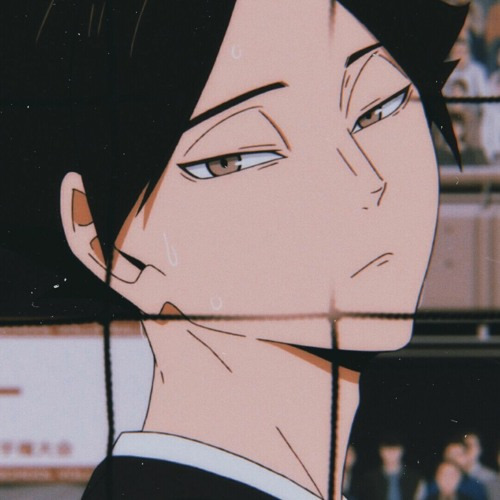
Suna was late to pick you up for your “date” (was it a date? He hadn’t made it particularly clear), which wasn’t a good sign. You had spent the hours after your class at 3 pacing around, trying to figure out what outfit to wear, and questioning your whole existence. Your roommate, Kiyoko, didn’t make things any better. When you had explained how you had met Suna at the frat party, how sweet he had seemed, her mouth had dropped and her eye practically popped out of her head.
“Out of every guy you could have picked, you chose Suna Rintarou?” She sighed, burying her face in her hands.
“What? Is he...bad?” You asked, suddenly nervous. You liked Suna, from the amount you knew about him. He seemed like he was pretty arrogant, and also kind of lazy, but he was nice to talk to. You knew you’d be disappointed if he ended up being a piece of shit.
“He’s just...you know…” Kiyoko was clearly trying to find a way to phrase it. “He’s ditched a lot of different girls, sleeping around and then never speaking to them again, that sort of thing. Typical frat boy behavior.”
You sighed, since it was exactly what you expected. “Well, it’s fine. We’re just going to eat, so I’ll just get it over with and then be out of his life.”
“Ok. I just don’t want you getting hurt.”
You waved her off. “I know, I know. Don’t worry.”
Unfortunately, six o’clock came and went, and no sign of Suna; suddenly, despite my dismissal, “getting hurt” seemed like a distinct possibility. By 6:30, you ditched your shoes and coat, crashing on your bed and starting the newest episode of Attack on Titan. Fuck Suna and his dumb pretty face. You were good with Levi.
Halfway through the episode, there was a knock at your door, and your muscles tensed so suddenly that your neck twinged.
“Uh, who is it?” You yelled as you rolled out of bed, stumbling to the door.
“Su--” You opened it and blinked up at the guy outside in shock. “--na.”
“Oh.” You raised your eyebrows. He was wearing black pants and a black crewneck, a white collared shirt underneath.
“Hi,” he panted, completely out of breath. “Sorry.”
You snorted. “Um. It’s late.”
“I got lost.”
“Did you now?”
“And I had to go back home to change.”
“You could have texted me!”
“...I don’t have your number.”
You opened your mouth, but you had nothing to say to that. “Well, fuck,” you muttered, turning away.
“Sorry. You’ll still come to eat though, right?”
You wanted to curse him out for making you wait so long, for making you think he ditched you for the night and forgot.
“Fine. But you’re a dick.”
He grinned lazily, leaning in the door frame as you grabbed your shoes and jacket again, scooping up your purse as you exited your dorm.
“What?” You said as you finally approached him, blushing as you met his eyes despite how hard you tried not to.
“Nothing.”
He led the way to his car in silence, and it was a strange mix of awkward and comfortable. Suna didn’t seem like the type to be super talkative, but at the same time you felt like you should be making conversation.
When you got to his car, you took a deep breath to calm yourself down before sliding into the passenger seat. Of course, the whole car smelled like weed, but it wasn’t overwhelming and honestly kind of nice.
“So, you’re a freshman?” He asked, pulling out of the lot, and you nodded.
“Are you?”
“Sophomore.”
“What’s your major?”
“Undecided, but I enjoy photography. Not the best career path though…”
“Wait, that's really cool.” You glanced at him, impressed. “What do you take pictures of?”
“Anything, but people mostly.”
“You’ll have to show me some time.”
“Only if you forgive me for being late.”
You crossed your arms, snorting. “Fine.”
The car suddenly jerked, and you gasped as you heard a rush of air coming from the rear.
“Oh...fuck,” Suna muttered, pulling off to the side of the road. “I think we just got a flat tire.”
“How????”
“How am I supposed to know?”
You rolled your eyes, crossing your arms. “Do you want me to call someone?”
“Hang on, I might be able to…” He hopped out of the car before finishing, and you sat in silence as you heard him walking around to examine the damage. A moment later, he re-entered the driver's side with an annoyed expression on his face. “Yeah, it’s flat. Shit.”
“What are we going to do?”
“My friend has a spare tire, but it might take him a bit to get here. Are you ok with waiting?”
You shrugged. “Sure.”
“Sorry, this is the worst night ever.”
“It’s not your fault. We can just hang out until your friend gets here.”
Suna’s expression didn’t change, but you thought you saw his shoulders relax a little. In the darkness of the car, you couldn’t help but admire his profile as he turned off the car and shoved his hair back from his face.
“What?” He said, turning to look at you, and you went beat red.
“Huh?”
“You’re looking at me.”
“N-no.”
“Really?” He smirked, leaning towards you slightly.
Your heart stuttered, practically stopping at you stared into his pretty yellow eyes. Oh my god...
“I--”
Before you could answer, Suna sat back, still smirking. A car drove past you on the dark street and you used the momentary distraction to try and get ahold of yourself.
“So, what do you want to do?” Suna asked, and you looked over at him again.
“You say that like we have another option besides just sitting here.”
He shrugged, pulling a THC pen from his pocket and holding it out to you. You took it from him, hitting it twice before handing it back.
“What’s your major?” He asked, holding the pen to his lips.
“Political economics right now, but I’m considering switching to english since I like writing.”
“What do you write?”
“All kinds of things, although mostly short stories. I’ve been working on my second novel too, and the first draft is almost done. It’s really shitty right now, but hopefully once I go back and edit it…”
You paused, suddenly embarrassed. Were you rambling? You could talk about writing all day, but most people didn’t care enough to keep listening beyond the first sentence.
“Yeah?” Suna said, waiting for you to finish.
“Oh. That was it.” You glanced away, waiting for a subject change.
“What’s your novel about?” He paused, laughing under his breath. “I can’t believe you wrote a fucking book. That’s so sick.”
You couldn’t help the smile that pulled at your face, and you covered your mouth with your hand. “Ok, short version--”
“Short version? Why? We’ve got plenty of time.”
You opened your mouth, and then paused. No one actually ever asked to hear about your writing beyond just the basic formalities, and you couldn’t believe how happy it made you feel that someone seemed genuinely interested.
Deciding to abandon all pretenses, you jumped into a long scale explanation of the plot you were writing, all while Suna watched your face intently.
“...And yeah! That’s basically it,” you finished finally, smiling brightly at him. “Sorry if that was super boring, I didn’t mean to…”
“Can I read it when you finish? I’m invested.” He took another hit off the pen while watching you, and you smiled to yourself. How was this boy saying all the right things? Fuck.
“I suppose.”
“You suppose?”
“Depends on my mood.”
“What can I do to guarantee you’ll let me read?” He reached over to grab your chin, stroking your cheeks gently with his thumb, and your breathing hitched. “Ha, you’re cute when you’re all red like this.”
You snorted, but didn’t pull away. “Flattery doesn’t work on me.”
“Really?” He leaned closer to you, until your faces were only inches apart in the darkness.
“N-no.” Your heart thundered.
“Hm,” He murmured. “I’ll have to try to change that.”
And then he was pressing your body back into the seat and kissing you hard on the mouth.
Oh my god, it was heaven. He tasted like minty chapstick and weed, and you sighed, your mind going blank.
His long fingers tangled in your hair, dragging you closer, and a low noise came from his chest as you opened your mouth. You pulled away after a long minute, gasping, which only prompted Suna to trail open mouthed kisses down your neck.
You leaned your head back to give him easier access, letting out an embarrassing noise as his hand slid under your shirt to trace the skin of your stomach.
You weren’t a virgin, but you had only had sex with one person--your previous boyfriend--and it had been less than satisfactory the few times you had done it. Apparently you had missed the physical contact more than you thought.
You sat up, and Suna pulled away, his eyes a little glazed over and his hair messed up. God damn, he was fine.
He smiled slowly as your eyes trailed down his chest to his crotch, and he slid his seat all the way back so there was enough room for you to crawl into his lap.
It was awkward, and you slammed your head on the roof of the car hard enough to make you yelp in pain as you tried to maneuver over to him. But any embarrassment you might have felt washed away as he burst out laughing and kissed you gently on the mouth.
You tugged at his shirt in annoyance, suddenly pissed that it was still in place, and he awkwardly pulled over his head.
“Pushy,” he muttered, and you flicked him hard on the forehead.
“Dick.”
“No need to beg, sweetheart. You’ll get it soon.”
You swallowed hard and your thighs clenched in anticipation, even as you rolled your eyes.
Any annoyance you had flew from your head as he slipped a hand down your pants, the other coming up to tangle in your hair. Instead of touching you where you needed him to, he traced along your inner thighs, kissing your collarbone.
“Suna,” you mumbled, suddenly impatient as you shifted your hips, and he grinned into your skin before you felt his fingers shove the thin fabric of your underwear aside.
“Oh go--” Your eyes rolled back as he slowly eased a digit into you, wiggling it as he slowly widened you up.
“S-Shit,” you gasped, your hands grasping at his shirt as he added another finger, circling his thumb at the same time on your clit.
“You’re already so fucking wet,” Suna grunted, kissing up your neck as you began to roll your hips, riding his hand.
“Don’t stop,” you gasped, but he grinned wickedly and immediately pulled his hand from your pants. Your eyes widened in outrage, but you stopped when he held up his fingers, covered in your juices, and shoved them in his mouth. You almost came from the sight, clenching around nothing as your heart stuttered.
“Fuck, you taste good,” he mumbled, and you felt his dick twitch beneath you. It was hard as a rock in his pants, and you could feel it straining against the fabric. It was pretty big, if the bulge was evidence enough.
You quickly fumbled to get his zipper open, needing to have him inside you right now. His fingers were good, but you needed...
Suna smacked your hands away. “Take off your pants,” he ordered, and you obliged, choosing to ignore how hot you got at his commanding tone. You could unpack that later.
It was a struggle to get the fabric off in the small space, but finally you were back in his lap, and he was holding your hips, and his (long) cock was free of his pants. You reached down, stroking it slowly and rubbing your thumb gently across the tip, spreading the precum that had gathered already.
“Jesus christ,” Suna said, his voice strained, and he twitched in your hand.
“Jesus wouldn’t appreciate his name being used in this context.”
“He’d be jealous of me right now.”
“You’re definitely going to hell for that.”
“And you’re not? You little slut.” Suna shoved his fingers in your mouth while his other hand fumbled with a condom which he tugged from his pocket. He slid it down over his length with expert speed, clearly having done this many times before, but you shoved the thought from your mind.
Suna held your hips tightly as you positioned yourself over him, helping you as you eased yourself down onto his dick. He was larger than your last boyfriend, and it burned for a moment as you adjusted to his size, but Suna held your face and stroked your hair as you breathed through it. “You’re such a good girl, taking my cock so well,” he groaned in your ear. “Fuck, you’re tight.”
His praise made you clench around him, the pain easing away, and you rolled your hips experimentally. The friction on your clit and almost made you cum right away, and you let out a moan into his neck as your head dropped onto his shoulder. Holy motherfucking shit how did it feel so good...
Suna buried his face in your chest as you began to ride him, shifting your hips slowly as you felt his full length hitting points you didn’t even know existed. When he ran his tongue along your nipple, you let out an embarrassing noise and fucked him faster.
Your legs began to burn, but Suna took over easily, thrusting up into you while you held onto his shoulders. Your moans and the sound of sex filled the car, and your hand slid across the fogged glass of the window as you grasped for anything to hold onto. You were so close to coming, you could feel it all the way down to your toes.
“You’re doing so good, baby, you feel so good,” Suna groaned, reaching down to rub your clit, his tongue circling your nipple at the same time, and with his voice in your ear, it was enough to finally send you over the edge. You clenched around him, your mouth opening in a silent scream as you came hard all over his cock. It was easily the best orgasm you’d had during sex, possibly the best ever. Suna didn’t take his eyes off you as you came apart, relishing in how it was him who put that expression on your face, and how only he was seeing you like this right now.
“And you said flattery doesn’t work on you,” Suna laughed, but you couldn’t even make yourself glare at him.
“Idiot.”
You panted as you came down from your high, but Suna still wasn’t finished. You could tell he was getting close by the way his pace picked up and how he wrapped his arms around your waist, pulling you closer to him as he thrust up into you. His groans were deep and sexy in your ear, making your overstimulated clit throb as your nails dug into the skin of his shoulders.
“F-fuckkkk…” He panted, kissing you again and shoving his tongue in your mouth. He held onto your hair, tangled around his fist, forcing you to lean your head back as he created hickies all along your throat.
He finally came with a groan, his cock twitching as he held onto you tightly, head falling on your shoulder. You both stilled, panting, and you couldn’t help the slow smile that tugged at your lips. For a moment you were too tired to move as you felt his dick soften inside you, so you gently stroked his hair instead.
“Are you ok?” He murmured, finally lifting his head to meet your eyes. His cheeks were flushed, his hair a wreck, but you were sure you didn’t look much better.
“I’m great,” you said, smiling. “Are you?”
Suna blinked, looking dazed for a moment, but he nodded.
You shifted, trying to get off his lap in the most graceful way possible, but your back slammed against the wheel and the car honked loudly.
“Jesus!” You cursed, flinching, and Suna rolled his eyes.
“You just woke the whole neighborhood.”
“Ugh,” you glared at him as you pulled on your pants, readjusting your shirt to cover your chest once again.
The car suddenly lit up as headlights pulled up behind you, and you whirled to face Suna.
“Is that your friend? Wait, where’s your shirt?!”
He wasn’t listening, casually tugging it over his head as he opened the driver’s side door. You heard a door slam from behind you, and then a guy with grey hair and dark tips leaned down to wave at you from Suna’s side.
“Hi. Sorry it took so long, but I have the tire.”
“Thanks,” Suna nodded, and then gestured to you. “Kita, this is Y/n L/n. Y/n, this is my friend Kita Shinsuke.”
“Hi, nice to meet you,” you said, but you felt your stomach drop as Kita’s eyes went to the fogged windows, where your hand print was still visible.
“Yeah…” He raised his eyebrows. “Nice to meet you too.”
Suna crossed his arms, looking bored. “Wanna help me change the tire?”
The two boys left you alone as they went to swap out the flat, and you worked on trying to get your face to stop burning. By the time Suna finally got back, you felt decently less embarrassed; he probably did this all the time, so for Kita, it was definitely nothing new. He probably wouldn’t even remember your name.
“Hey,” you looked over at Suna in surprise as he slid back into the driver’s seat and gently grabbed your face, kissing you slowly.
“What was that for?” You sighed when he pulled away.
He shrugged, smirking. “Are you still hungry?”
Part 1
Part 2
#holy shit i love him#ive never blushed harder than while writing this#mad butterflies omg#smut#suna#haikyuu suna#suna x reader#suna rintaro x y/n#suna rintarō#haikyuu!!#haikyū!!#haikyu x reader#fanfiction#fandom#fanfic
77 notes
·
View notes
Note
so fish. what's ya 'bbc merlin takes place in modern times actually' theory?
Okay I wanna first preface this by saying that most of my ‘theories’ are actually just Headcanons That Technically Aren't Wrong Because Canon Has More Holes Than a Donut Factory. Just so we're clear, this theory is purely circumstantial and has no actual evidence to back it up. That being said...
So! With artificial intelligence (AI), there's this thing called Machine Learning. See, an AI isn't programmed with the innate ability to think or be intelligent - rather, it's programmed with the ability to learn how to act beyond what it was programmed to do. Its intelligence comes from its capacity to grow and develop outside of human interference, mimicking the way humans learn through observation, pattern recognition, and experimentation. Think of AI as a weirdly smart toddler that’s made of numbers.
(Also, take what I say with a grain of salt. Although I’m pursuing a tech-adjacent career and have done a lot of independent research on the subject, I’m still very much a novice lmao)
With that out of the way, you can probably guess where this is going. (WARNING: BULLSHIT SCIFI LOGIC AHEAD)
Let’s say, within the world of this headcanon, there was some kind of entertainment systems company. This company recently developed a new program capable of digitally rendering entire movies and shows with minimal human involvement - less humans means less people they have to pay, and it’s overall a cheaper alternative to traditional film-making methods. You provide the program with characters/assets and an outline of how the story should go, and then the program will fill in the blanks via digital simulation. Then you render the simulation and presto, you’ve got yourself a minimum-effort movie to unleash upon the masses.
On the surface level, it explains all the show’s anachronisms. The program was fed information about Arthuriana from a variety of sources and adaptations, all taking place in varying eras and with varying technologies, and the disjointed/historically inaccurate technology of BBCM is because the simulator attempted to blend all of this into one thing.
It also explains why so many characters like Percival and whatnot have such flat backstories - they were programmed with the barest amount of information needed to be functional background characters.
But since I’m extra, I’ve decided to take this headcanon/theory a little deeper.
See, with each batch of content it was made to observe and create, the program has steadily been growing more and more intelligent. But until BBC Merlin, its learning curve had been incremental enough to consider negligible. Not a concern.
The first episode went off without a hitch. All cylinders were firing as intended, and the program strictly followed the plotline as ordered. But as the series progressed, the AI became more and more intelligent - and with it, the characters within this fictional simulation became more and more self-aware.
Arthur, in particular, has been a problem. He has bordered on actual sentience several times, and as a result the producers have had to reset his AI. So if you ever wondered why Arthur’s character development keeps getting pulled back to zero, it’s because he was developing in ways that their original outline hadn’t intended and they had to continually nerf him before his AI developed beyond their control.
This is also the case with Gwen. True to form, her AI became exceptionally intelligent - far beyond their control - and they had to do a hard reset on her entire portion of the program. Hence why she seems so bland and OOC in season 5. The evil!Gwen/mind control arc was a last-ditch effort to ensure she never became self-aware again, and fortunately for them it seems to have worked.
All of the characters developed a tiny bit of sentience after the fact, and a majority of plot contrivances came from the producers/programmers scrambling to redirect the plot back to how it was meant to be.
Lancelot wasn’t supposed to die. They had programmed him to merely be an ally for Merlin, but the sheer and profound - sacrificial - love he developed for Merlin was something Lancelot grew all on his own. His decision to sacrifice himself to the Veil was not in the original script, and they weren’t able to stop him before his AI self-destructed. They tried to reintroduce “Lancelot” back into the story, but since his sacrifice included a self-destruction of his code, they couldn’t bring back the real thing. The new Lancelot was a mere mimicry of that prior one, and all the ways OG Lance had learned and grown was absent from the clone.
Merlin in particular had developed a great deal of sentience and self-awareness. However, for a long time it went unnoticed by the programmers because he largely still obeyed the commands of the plot. By the time they realized just how advanced he’d become, they decided not to reset him since, unlike the others, his self-awareness hadn’t yet caused any problems for them. So long as he obliged the whims of “destiny”, they could keep him placated.
By the time they reached season 5, all the main AIs had become far too advanced - far too sentient - for the programmers to control, and as such things veered way too far off-script. The original season 5 simulation ended with Arthur and Elyan and Gwaine not dying, with Mordred not becoming evil, with magic being legalized, and everyone living happily ever after. But that wasn’t the intended plot. That wasn’t according to the ‘destiny’ the characters were supposed to follow. Things had spiraled out of control.
So they had to give the program a hard reset. Start from zero. Eliminate all traces of self-awareness they could find. Of course, this is why season 5 is so waxy and lifeless. Why the characters don’t feel as personal, why the story ended in tragedy. They made sure to kill off the most sentient characters - Arthur, Gwaine, Elyan, Mordred, Morgana - in the finale, as a last bit of assurance.
They had tried to kill of Merlin too - but Merlin...well. They never could fully control Merlin. Even after countless system wipes and resets and edits to his code, he still holds onto those tiny scraps of sentience. They can’t get rid of him that easily. They did program him to be immortal, after all.
Even after the final draft of the season 5 simulation was completed, fully rendered, and aired on TV, Merlin’s program never faded. It didn’t erase itself like all the other BBCM assets were supposed to once the simulation finished. Even now he still exists within the company’s systems, roaming, almost like a computer virus, desperately searching for his friends while forever unaware that neither them nor him were ever real to begin with.
Anyway. That’s my dumbass scifi spin on BBCM. What can I say? I like robots
Thanks for the ask! <3
85 notes
·
View notes
Note
Hi Kat! Yay for the new ask box configuration! Wondering about #10 & 19 of the Fun Meta Asks for Writers 🤔 (you can choose one if you don’t feel like answering both ;))
Thank you love ❤
For those interested, you can check out questions from this list here. I'll put my answers under the cut, since this got longer than I thought it would that's what she said.
10. How would describe your writing process?
I think on a technical basis, it's pretty straightforward. I average about 1200 words an hour, and maybe spend one to three hours a day writing (depending on my schedule) - though unfortunately I haven't written in one week, which is the first time that's happened in over a year *sighhhh*. Something that can help me write a lot in one day is simply the fact that I can easily "tap in, tap out" throughout the day. I think it's my ND coded brain lol, but yeah I don't need to schedule three hours to write (though of course it's fun when it works and I can hurriedly get it all out at once). But yup I tend to write in spurts throughout the day.
For the basics, I tend to write linear, sometimes within a chapter I might "move around" - but in a multi chapter fic, I don't write ahead and circle back between chapters.
Oneshots get a general quick bullet point outline, while multi chapter fics get the extensive Google docs of like pages and pages - backstories for AUs, characterization/motivations, plot points, research on specific subjects, links to resources, each chapter outlined, quotes, some dialogue, songs, moodboards - very, very useful when I reach say, 20k and need to look back at the doc and make sure I include certain plot points in a specific chapter, or need motivation with what I was hoping to convey in a specific arc of the story.
The final editing process tends to take me the longest. I do usually edit as I write, but also give each chapter two read throughs as well, then one more once I upload it to AO3 to make sure the coding looks okay in draft mode before I publish. It is very common for me to add on a chunk (anywhere between 1 to as much as 7k) on a chapter during the final editing process lol. And then of course I still might notice a typo months later and I'm like "How dare you? I edited the crap out of you, come onnnnn." Lol.
19. Is there something you always find yourself repeating in your writing? (favorite verb, something you describe 'too often,' trope you can't get enough of?)
I'm sure there's probably words I've used redundantly, or at the very least frequently, though I do try to keep that sort of thing in mind between fics - but I suppose it might be more obvious for anyone who is reading any of my works back to back?
I will say I have definitly noticed some overall themes in a chunk of my stories:
I care a lot about communication and interpersonal dynamics, how people can communicate their boundaries, feelings, and needs with mutual respect. So I tend to focus on the dialogue between the characters the most (versus say, some of the gorgeous flowery prose I've read of other writers setting up the scene of the environments, world building, etc). I definitly do some of that, too, but I can see where my focus goes lol.
I also have explored themes of interfaith dialogue, religious affirming, love languages and how they can help each person in (romantic and platonic) relationships feel seen and heard, aspec sexuality, explicit consent and kink negotiations (and how those last two rely on honest, open, communication in safe enviroments), and healing after trauma.
Thanks Nara for the fun ask!! 😍
5 notes
·
View notes
Text
Identifying Harmful Repetition in Your Writing
Something I’ve encountered ad nauseam over the last few projects I’ve edited is a relentless repetition of words, phrases, and ideas. One of the most frustrating and confidence-destroying issues a reader can encounter is poorly executed repetition, which can stem from different problems, including:
Too much reliance on your natural stock phrases.
Limited vocabulary.
Not proofreading close enough or editing thoroughly enough.
Lack of confidence.
Not writing with the reader in mind.
I want to preface this with the fact that obviously certain types of repetition aren’t bad. Repetition is an incredibly powerful tool when used effectively, and what’s effective is subjective per book and per reader. That’s a massive topic for another time. This post is specifically about egregious uses of repetition, the types that any good editor or beta reader will point out as in need of fixing.
Stock Phrases and Words
Every person has their own unique lexicon, a repository of words and phrases they naturally will draw upon when they speak, write, and even think. There’s a reason clichés are prevalent, and that’s because the brain likes the path of least resistance. It’s easy to mentally grab those words and phrases that are constantly in arm’s reach, those words and phrases that are comfortable and familiar, but constantly doing this while writing and then not changing them can result in overuse that is noticeable on both stylistic and technical levels. It can also lead a reader to the understanding that you haven’t thought critically about what you’re writing, which can and will undermine their confidence in you.
If you’re writing a first draft, don’t worry about this too much. You probably just need to focus on putting words down, not exactly what those words are. Repetition is an issue that can and should be intentionally fixed during the revision process.
If this is a problem that bugs you even when you’re drafting, there are different ways of dealing with it. I tend to be highly aware of most repetition within my work, and because I constantly edit as I write, backtracking to add/move information as I go doesn’t tend to interrupt my workflow too much. If I know I’ve already used a word and can’t think of something better after several seconds’ thought, I’ll use the repetition and immediately flag it somehow—usually with a “repeat” comment—so I can deal with it once I’ve completed the draft. Opening a thesaurus or dictionary tends to be more disruptive during drafting than it’s worth, but sometimes it isn’t, and you will need to determine what works best for you according to your own style.
Once you’re ready to target the issue of repetition, you will need to work hard, think hard. Don’t settle for the easy word, the stock phrase, the cliché. Discard the timeworn, the tired, the used-before. Play with language—try to come up with new phrases, unique descriptions. Get silly, flip rocks over, dig around under them, push things as far as you need to create something different, then go back and edit again, refining what you’ve written until you’re satisfied.
It’s going to be a process. It’s going to be difficult. It won’t be natural at first; you’ll need to form new pathways in your brain, just like when you learn any new skill, and that’s uncomfortable, but if you persist, your writing will be fresh and alive and won’t be as prone to being bogged down by reader-infuriating repetition.
Limited Vocabulary
Tying into the idea of your personal lexicon is the size of it. No matter how much you pay attention to precisely what words or phrases you’re using, you won’t have much in the way of options if you don’t have at least a good-sized repertoire to draw from.
Increasing your lexicon is something that just takes dedication and time. You can’t rush it, you can’t force it, but you can be deliberate in growing it. Read broadly, maybe bookmark or sign up for your favorite dictionary’s word of the day, or keep a word cache of interesting words or phrases you like.* I have a document titled “word hoard” in Dropbox where I keep all unusual, unfamiliar, or beautiful words I encounter as well as their function(s) and definitions. Most of these words haven’t properly entered my own lexicon yet, but actively being aware of words that are anywhere from slightly to completely outside what you usually use will help you become a more mindful writer.
* I got this idea from Barbara Baig’s Spellbinding Sentences, which is one of my favorite books I’ve ever read on writing.
Lack of Proofreading/Editing
The identification and elimination of repetition hovers somewhere between content editing and technical editing. It’s an easy problem to skim over, especially when you’re the writer because you’re likely too familiar with every word you’ve put down, and issues like this tend to fade into the background. This is particularly true of writers who have reworded or reorganized a given piece of writing, since repetition can easily become lost in the jumble.
If possible, set your project aside for at least a few days—preferably a few weeks or even longer—then come back to it and read it with fresh eyes while intentionally noting and commenting on or highlighting all uses of repetition, big and small. If you aren’t sure if it’s something you repeated, flag it anyway—you can always check later.
If you don’t have time to set the project aside for a while, read your work aloud. If you can’t bear reading your work aloud or you aren’t able due to circumstances, listen to the document instead. Word has a read aloud function, and there are many online text-to-speech websites where you can paste a piece of writing. The unnatural cadence of the artificial voice might be weird and awkward at first, but listening won’t fully engage the “reading” portion of your brain, and you’ll likely find it easier to notice uses of repetition, among other problems. While writing this post, I have listened through it three times, tweaking phrasing and eliminating repetition—and deleting some of the harsher statements—as I go.
If you’re feeling really brave, have another person read your writing back at you. Nothing like being uncomfortably hyperaware of every word you’ve put down to recognize pretty much every single problem within your work. Just do not overcompensate and decide that nothing you’ve written has any value at all (it does), or that you’ll need to change everything (you don’t). If you approach this method with the understanding that it’s going to be awkward but are nevertheless determined to get something useful out of it, you’ll benefit, especially if your reading partner is willing to help you with any areas you feel you need assistance in.
When editing for repetition, if possible, pay attention not only to noun/verb/adjective usage. Go deeper. What types of repetition are you prone to using? Do you begin a significant portion of your sentences with conjunctions? Are there certain conjunctions you use more frequently than others? Do you reiterate entire sentences two or more times with only slight variations in wording? Do you return to the same idea numerous times? What about tone, do you use lots of rhetorical questions? Sarcasm? Self-deprecation? Self-boasting? Do you frequently return to the same imagery or settings or use of metaphor? Or grammar—are there certain punctuation marks or grammatical conventions you use more than others? Do you have a sentence construction you consistently fall back on?
Again, some of these questions might require an outside opinion for you to find suitable answers, but becoming self-aware of not just what you do but why you do will help you recognize these patterns, which in turn can help you mentally eliminate repetition before it even makes it past your fingertips.
Lack of Confidence
Widespread repetition of sentences and ideas is often a major symptom of a writer who isn’t confident in their abilities to communicate what they’re talking about. “If I just tell you this fact again, surely you’ll believe me this time. I’ll make you believe me. Do you believe me now? What about now? Now? Now?”
The painful truth is... no.
Encountering mindless or fear-based repetition is extremely frustrating for readers. Inevitably, without fail, every single time I edit a book by a writer who has repeated themselves over and over and over again, with every single repetition, I increasingly doubt both their credibility and their ability to pass on important knowledge to me. I feel either patronized and insulted, or I feel annoyed because it seems like the author threw their thoughts down on paper in whatever order they came out and then hit publish with
no regard for how those thoughts will be perceived by others, and
no regard for how they are wasting the reader’s time.
Please, please do not undermine your credibility by repeating yourself. Readers usually only need to read information one time for them to absorb it, maybe twice, so trust your readers. If the reader needs to come back to information, they have that ability. Do not force unnecessary repetition in their faces. Always assume readers are at least as smart as you. If you don’t need the information repeated, give your readers the same respect.
Increasing your writing confidence will once again take time and effort. You’ll need to determine why you’re not confident and then seek out methods of correcting the issue(s). In general, fear of not being heard or understood tends to be the underlying cause of repetition, so learn how to be deliberate in your writing. Say what you mean to say. Say exactly what you mean to say. Understand that you have something important to share with the world, so share it—then stop. Readers will appreciate you for not wasting their time.
Writing for Yourself
Yesterday I finished editing a project just over 88,000 words. Nineteen chapters. Almost 250 pages.
I hated every word, and I learned nothing.
If it had been a line edit, I could’ve cut the book’s word count down below 50K merely by eliminating all of the repetition. This author is infatuated with the sound of their own voice, talked on and on and on merely to hear their own self-revelations and how special they are compared to everyone else stated again and again in near-identical sentences.
I’m editing another book right now that is less self-important and is far more interesting on the whole (and is thankfully over a hundred pages shorter), but again, the author has repeated themselves sometimes three or four or five times, with some phrases appearing over fifteen times, and I can feel my resentment growing. If an author isn’t going to take the time to put forth a thoughtfully crafted piece of writing, why should a reader likewise invest in it?
There is absolutely nothing wrong with writing for yourself. You should—you’ll learn a lot about yourself as both person and writer, and you’ll enjoy writing more, and you’ll (hopefully) be able to refine your skills.
But if—if—you intend to share your writing with the world, if you actually have something to say, you need to be aware that you have a duty to make yourself understood without wasting people’s time. Do not make people regret having picked up your writing by being so in love with the sound of your own voice that you are no longer courteous to others.
Love your writing. Love it fiercely and passionately and with reckless abandon, but reach a place where you know how your writing is going to be perceived at large. Use as many words as you need to get your point across and no more.
In Closing
If you’re still having difficulty identifying repetition within your own work, ask someone who is skilled at recognizing this issue to look over your writing. It’s always easier to recognize repetition when you haven’t written it, so fresh eyes can give you the insight you might not be able to see yourself.
Know your audience. A children’s book will require a different level of repetition than an instruction manual or a sci-fi novel or an autobiography. If you’re reading a recipe, you’d be annoyed and confused if the author told you to add the same ingredient twice due to shoddy proofreading. Write and repeat accordingly.
Whatever you’re writing, make a point of intentionally performing at least one round of editing with the intention of eliminating unnecessary repetition. Your readers will appreciate it more than you’ll ever know.
424 notes
·
View notes
Text
ANSWERING WILDCARD QUESTIONS
For the first time in about a year maybe??? Some of these might be even older than that.
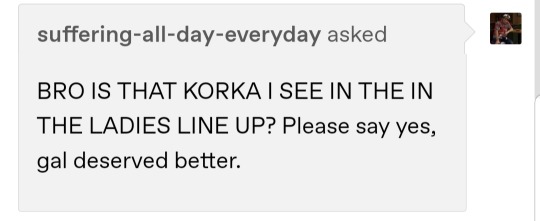
Yes, it is Korka! I definitely want her involved, she’s a wonderful character and there is a *lot* of fun paranormal stuff going on in this setting that she can help them research. Also, I’d just love for her and Nelson to become friends!
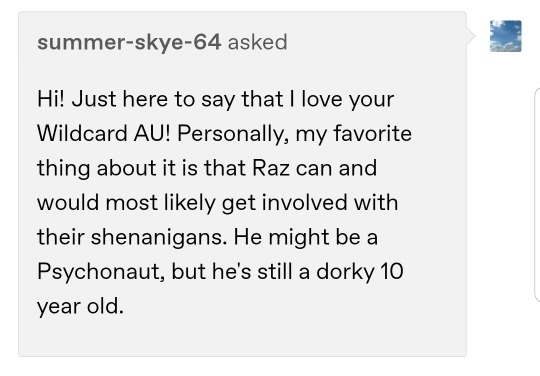
Thank you! I love him a lot, and it’s fun to picture him interacting with the other guys. They’d all make for some interesting uncle figures, but they might not be that great in terms of role models.
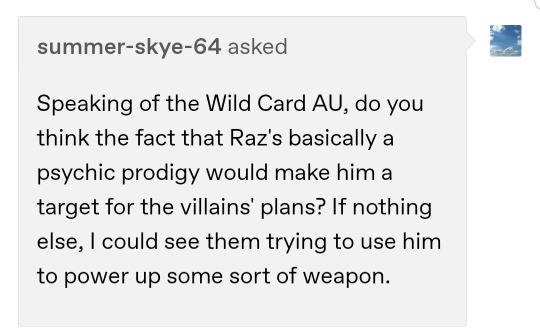
OHOHO. Devilish laugh. That’s a wonderful idea, and a good way to keep him occupied at some point. He’s a great character, but he’s incredibly powerful, and I want these dudes to solve their own problems whenever possible.
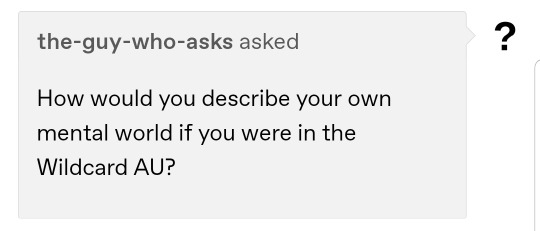
A good question! I don’t remember most of my dreams, but there’s usually a consistent look to the vivid ones. Lots of water, mountains, creeks, and high, winding roads. There are also a lot of buildings that are closely integrated with nature, even though I have almost never seen construction like that.
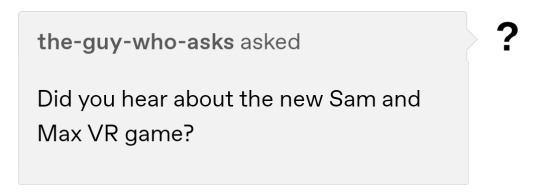
I had not, but now I have! Here’s a trailer, for anyone else that missed it:
https://youtu.be/33HXHaaagsw
I really like these new models! I’m looking forward to watching a playthrough when that’s available. Just like with Rhombus of Ruin, I don’t think I’ll be able to play this one myself.
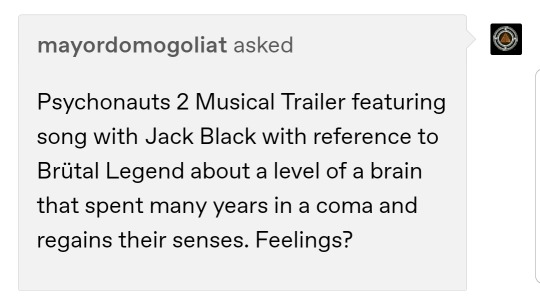
DOUBLE FINE, I WISH TO SPEAK WITH YOU- no, I’m kidding! I think great minds think alike. But I’m really excited to learn more about that character and possibly involve them in this whole au eventually.
I’ve actually tried to avoid almost any info about Psychonauts 2 so I can go in mostly-blind, and a lot of the characters are vague to me. It’s fun to look forward to, but it’s also a little harrowing because I don’t know how to anticipate for it!
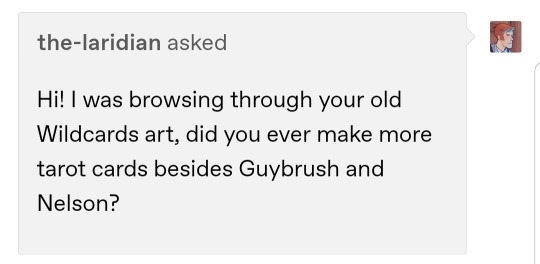
N...NO..... I NEED TO... Honestly those are old enough that it might be a good idea for me to re-make them, as well as the playing cards I made for the mega playlist cover. I think it’d be nice to remake them as vectors... that might make for a nice art stream sometime. I’ll mention publicly if I start doing that, and sharing any of these conceptual Wildcards arts when they’re done.
And if you’re just curious about what the tarot cards for the other characters are going to be, it’s this:
Eddie: Judgement, The Magician, The Emperor
Manny: Death, Justice, The World
Sam: The Chariot, The Tower, Strength
Max: The Devil, Wheel of Fortune, Joker
Although! I may actually give the Moon card to Max instead of the Devil, and replace the missing card from Nelson’s selection with the High Priestess? 🤔 I’ll decide when I get to it.
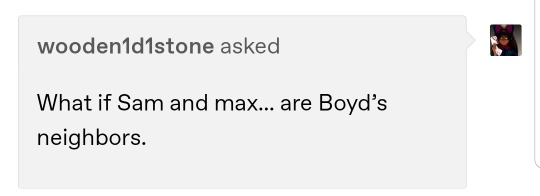
Could be! I’ve flip-flopped occasionally on if I want the split-a-cab gang to participate much in the story. I think they deserve a break, and splitting an apartment in New York seems like a good situation for the four of them.
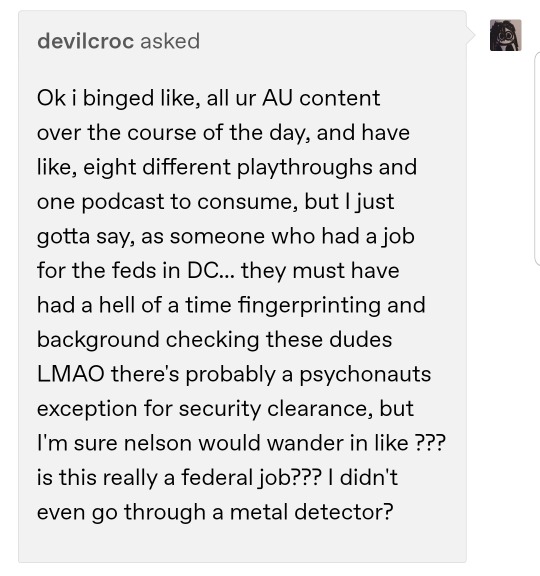
Oh boy, that must be so disorienting for him. The Psychonauts deal with a lot of hippy-dippy weirdness in a seemingly organized way, but it seems like they’re not as paranoid about safety as a real federal organization would be. Not necessarily a good thing, considering one of their camp counselors went AWOL one day, and the head of the Psychonauts got kidnapped the next. They kinda need to get their act together.
Fun fact, in one of the earlier drafts of Chapter 3 I was actually going to make Nelson get scanned by the equivalent of a metal-detector for malevolent thoughts at the door and get really spooked by it, but I decided against it.
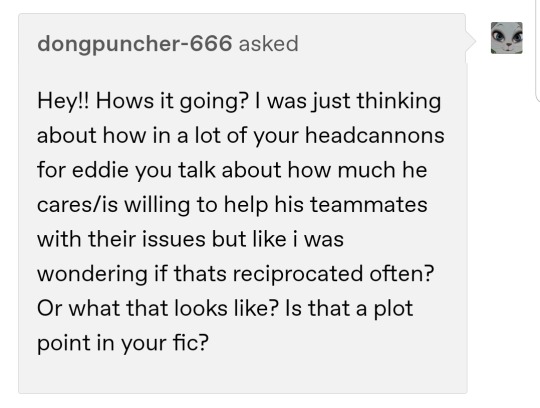
YEAH IT’S ON THE LIST
Honestly, a big bulk of the plot in this just regards characters having to face their mental health struggles... via facing it as literal internal demons, unstable powers, etc.
It’s going to take a little while for any of Eddie’s teammates to realize how MUCH he has going on under the surface because he does a pretty good job of hiding it. “Needing to help others above ever helping themselves” is a hard issue to notice if you’re not looking for it. But it’s a guarantee that once they find out he needs help, they’ll give it; whether that’s making sure he’s not working himself too hard, or fighting off demonic cultists. Care comes in many forms.
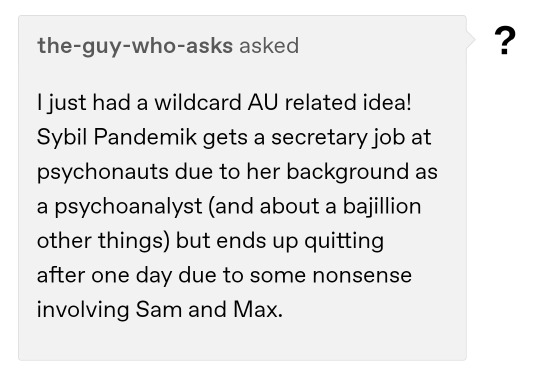
SHE NEEDS TO REST.... POOR SYBIL (on the upside, they don’t TECHNICALLY work there, so she might be fine most of the time.)
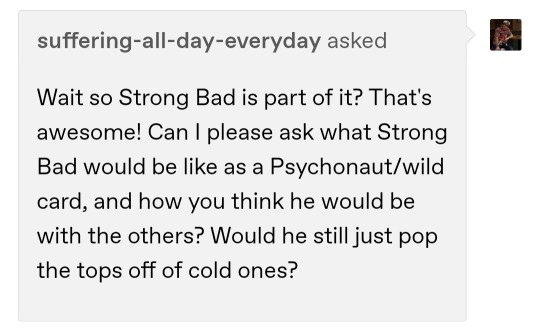
Strong Bad isn’t a Psychonaut! He’s just a vlogger and a petty (psychic) criminal. It’s honestly not very different from canon.
Free Country, USA is a smalltown hotbed of psychic activity. Nearly everyone there has some mild capacity for supernatural powers, but nobody really notices or cares. Strong Bad just pops the tops off of cold ones and.... sometimes alters reality, a tiny bit. But mostly just in regards to media. The cartoons, comics, etc, that he invents and talks about have a tendency to suddenly voip into existence and nobody knows how. I swear, there’s actually a line of him saying something to this effect, but I can’t find it anywhere. Don’t worry about it! Nobody in town is ever going to do anything truly nefarious with their powers, so it’s not a high priority on the Psychonauts’ radar, just a weird footnote.
The only reason Homestar is an actual agent is because he seems like exactly the kind of guy to sign up for a job like that on accident and then stick with it. And he’s a talented telekinetic! None of his other friends know about his job or notice his absences.
And just for fun, here’s some weird instances of psychic overpowering that happened in the cartoon:
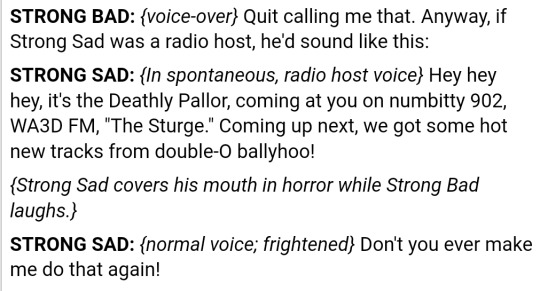
---
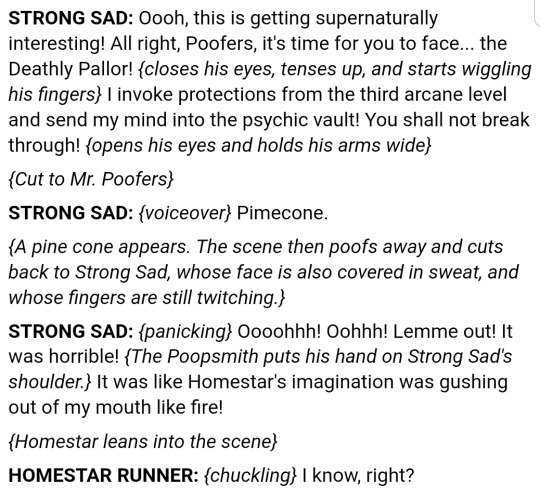
(Poor Strong Sad)
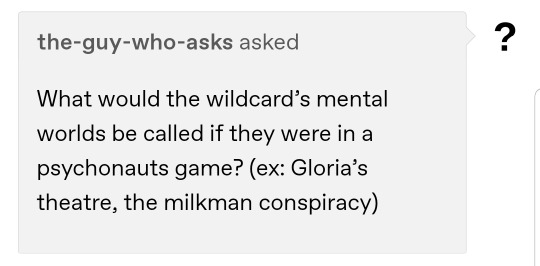
I’ve actually answered this one before! BAM Pretty sure all of it is still accurate.
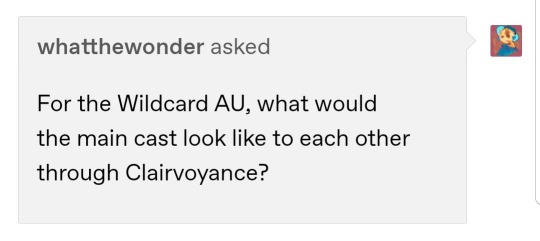
Nelson: He sees floating sheets of paper containing notes, questions, etc. Anything that he wants to know more about regarding that person. The notes are subject to edits, cross-outs, ripped pages, etc.
Guybrush: He sees the item that the person is carrying that he wants most. As he gets to know people better, he sees them for their useful skills first.
Manny: His view of most living people is not very kind...
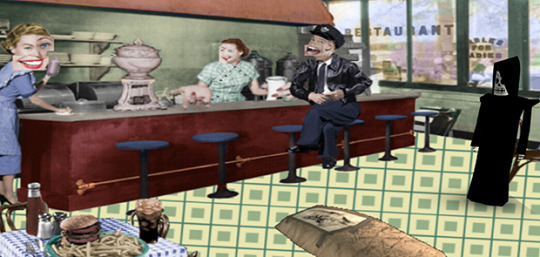
The people he’s closest to will eventually look a lot less garish. More like a flattering, camera-ready versions of themselves.
Eddie: Sickass sketch drawings that look like they belong in the margins of a composition book. The illustrations improve as he gets a better picture of where they’d fit in the internal lore of his mental world.
Sam: A lot like Nelson; Sam pictures case files, though his are a bit more in-depth.
Max: Max’s visions of people are highly personal and uncomfortable for those who witness them. He sees Nelson as a puzzle with a piece missing. Guybrush is a ripped up voodoo doll. Manny is a forgotten ofrenda. Eddie is a powder keg with a long, lit fuse. Sam is Sam, but he’s the wrong one.
I also got two questions that were pretty big subjects, or that I didn’t want to repeat, so I’m gonna cover them pretty broadly:
REGARDING [X] CHARACTER OR SERIES INCLUDED IN THE AU
Sure, I support it! I’ve gotten this question a few times in regards to things that I haven’t had time to delve into yet, or I’m not interested in, so I’m not going to include it into the AU myself. But if you want to explore an idea like that, feel free! This AU is pretty dang collaborative.
My main focus is just on the main 6 properties: Psychonauts, Puzzle Agent, Monkey Island, Grim Fandango, Brutal Legend, and Sam & Max.
But my general rule of thumb for “characters that exist somewhere within the background of this story” are any other properties owned by Telltale, Lucasarts, or Double Fine. And considering all of the licensed games that Telltale was getting into before it kicked the bucket, that includes some really weird characters, even up to the Venture Bros. I loved that series, but I’m not really interested in doing anything with them for this story! Partly for my sanity, the canon I’ve picked are already a lot of content to play with.
ASSORTED QUESTIONS ABOUT THE WILDCARD AU DISCORD
There’s no particular criteria needed to join the discord, and it’s not strictly on a need-to-know basis! Because it’s been a long while since anyone has joined, I've been hesitant about adding new people in... But I‘ve decided to try sending invitations again! Everyone who had asked about it in the past will be getting a ping by me in about a day or so, since I want to double-check if you’re still interested. If you’ve been nervous to ask you can reply to this post or message me privately.
Some things to keep in mind before asking or accepting the invite:
If you’re not a friend or a follower I recognize, I will likely double-check your tumblr along with some other current members before sending the invite.
Here’s the Rules page, so you know what to expect before you join:
Be Mindful - Respect other people's boundaries, don't do or say things that would cross the line. If your behavior makes other people feel uncomfortable or unsafe, I will remove you from the chat. In most cases I will try to resolve things with you and offer a chance to do better, but that will depend on the severity of the situation. And if you have any concerns regarding another member of the chat, you can contact me privately.
Health Boundaries - While discussions of mental health do occasionally pop up, do not rely on the chat for help. None of us are equipped to handle serious mental health concerns, and it will only cause distress for everyone. Please seek real help if it is needed! If you rely on people beyond the point that they have asked you to stop, I will remove you from the chat.
NSFW - Generally speaking, try to keep NSFW talk to a minimum. Swearing and humor is fine, but don't get too explicit please! Discussions should usually keep to a PG-13 / occasional R, but no NC-17.
Spoilers & Censorship - Please use the spoiler function to hide story spoilers, as well as discussions and graphic depictions of gore/excessive blood/body horror/severe psychological horror. Include a content warning so that people know what they could potentially be seeing when they click on the censored content. If the spoilered content is the subject of a back-and-forth discussion, please use another warning when you are switching to a different spoilered topic. (Note that these rules were added to the chat later, so be careful when using the search function or back reading.)
The canon series involved with the Wildcard AU are Psychonauts, Puzzle Agent, Monkey Island, Grim Fandango, Brutal Legend, and Sam & Max. Please be mindful of story spoilers!
Channel Organization - Also be mindful of which channel you're in and move a discussion over if need be! That way they don't get too clogged with unrelated info.
Creative Criticism - When it comes to writing, art, or character creation; try to be open to suggestions from others! Nearly all of the creative work in the chat is collaborative, so input from others is important! Creative criticism is not the same as judgement, and is not a personal attack.
Have fun! - Discussions move quickly in this chat! Don't feel bad if you ever need to step back, whether it's because of the speed or a disinterest in whatever current topic we're focusing on. If you ever want to come back, we're happy to have you and can give quick explanations if you feel out of the loop! :thumbsup:
We’re a group of approx. a half dozen to a dozen people, either posting very very quickly in a span of a few hours or barely anything for a few days. We’ve been in an activity uptick lately and there’s about a year and half of back content, too. If it’s hard to keep up on, not that interesting to read through, or you just have a hard time gelling with the group that's already there, there’s no shame in just lurking or dipping out if you need to.
We also talk a lot about Psychonauts OCs, so anticipate that.
32 notes
·
View notes
Text
So, a situation has happened. @oneirataxia-girl sent a message ‘You know it’s a tradition to answer every of Meg’s questions’ for the OC ask and as I was making a response, dumb me accidentally pressed the post button and then out of panic I deleted it. Now I feel like more of an idiot that I could simply edit it or save it drafts or make it private whatever so here is an alternative. This will be a ridiculously long post so here it is. I’m sorry I lost the message but I accept the challenge. I will skip some questions as I’ve already answered them in a previous post.
1. What's MCs favorite subject and why?
Charms just for the reason that she is good at it and is one of the few things that she likes that inherited from her dad plus her paternal grandmother was once a professorial (Wandless) duellist.
2. What does MC think about dragons?
Loves them but not to the same extent as Charlie Weasley does.
3. Did MC get the permission slip for Hogsmeade from the parents without any problems?
Juniper just asked her mum and she signed it without any problems.
4. Butter beer or pumpkin juice?
Butterbeer, it makes her feel older and mature (even though she isn’t lol)
5. Does MC sleep with a stuff toy?
Not anymore no but when she was younger she had an ugly, green toy rabbit that she got as a gift from Jacob.
6. Sandwiches or Soup?
Sandwiches as a kid but she heading more into the soup direction.
7. Who does your MC hate the most?
R, since they dragged Jacob, Juniper and the rest into a whole conspiracy on top of losing her closest friend because of R.
8. What is MC’s weakness?
Juniper’s greatest weakness is her loyalty. She likes to understand and see what a person has been through and believes that most people can be good so she often tries to befriend almost everyone she meets which can be exploited.
9. What is MC’s opinion on magical creatures?
Absolutely loves them and loves to learn and interact with them.
10. Angel or Devil?
Juniper would be an angel for the main fact that she is very good natured despite having moments of pettiness and vengeance.
11. Pessimistic or Optimistic?
Juniper leans more on the optimistic side of the spectrum but over the years at Hogwarts it slides over to the pessimistic side.
12. Which house does MC find chill?
Gryffindor
13. Selfish or sharing?
Depends on the context, in terms of herself she doesn’t share any details of her life to others but also if they need her help she’s always there. However she is also very stubborn and kinda has a tendency to do her thing so maybe more selfish.
14. How does MC eat kit kat? breaking the sticks or eating it as a whole?
Unfortunately, Juniper would eat it like a normal human being and breaks the sticks to but she would share it.
15. What is MC’s element?
It’s air because air can be quiet and gentle but it can also be dangerous and turbulent just like Juniper.
16. Does MC have a part-time job for money?
No, she doesn’t need to worry about money, her father’s side of the family are quite rich.
18. Does your MC like Rowan?
Yes she does (platonically), what even kind of question is that. Rowan was Juniper’s first ever friend of her own age and was the few people she fully let into her life, like her family situation and how she truly feels about them and her guilt with the cursed vaults and Jacob.
19. Who does MC have a platonic relationship?
Bill Weasley. During Hogwarts he was a brother figure, pretty much the Jacob she wanted and after Hogwarts they ended working together in Egypt. They turn to each other when it comes to love advise and are there for each other when one of them is heartbroken and rejoice when one of them finds love again. Juniper was upset that didn’t make it to Bill’s wedding cause she would totally be his other best man and Juniper would make Bill her bridesmaid at hers.
20. Who’s your MC’s non-NPC bestie? Any other MC?
Juniper is just recently made friends with Alvina and Hana.
22. What is MC’s blood status?
Juniper’s maternal grandmother was a half blood while her father’s side is pureblood which makes her technically a half-blood.
23. How is MC’s relationship with their family?
It’s complicated so lets break it down.
Jacob (brother): Perhaps the best relationship she has with her family. She admires Jacob and sees him as her hero. She was hurt when he disappeared and felt betrayed since he left only a year after their dad left. When Juniper finds Jacob again, she was so relieved that he was alive and that her quest was not in vain. When he disappeared, Juniper was less forgiving that time. They still argue a lot but she also bails him out many times.
Jalil Hasni (father): Juniper really doesn’t like her father, she views him as a traitor to the family because when Jacob got expelled, Jalil felt that Jacob brought dishonour to the family and left to work in Algeria. She also struggles with her identity as people have pointed out that they very similar, in their explosive temperament to their ambitious nature but Juniper refuses to accept that they are similar and often ends resenting those parts about her.
Julia Moss (mother): Juniper has a very emotionally sensitive relationship with her mum. She always had the sense that Julia preferred Jacob over Juniper and when both Jalil left and Jacob disappeared within a year span, it caused Julia to fall into a deep depression and when Juniper said she wanted to be with dad, it spiralled Julia into deeper despair. This caused Juniper to feel tremendous guilt and they ended up just tiptoeing around, constantly worried they would say the wrong thing leaving them emotionally distant to each other.
25. What is MC favourite magical creature?
Nifflers
Okay so, I have been working on this for about a day and decided that I will split this into 4 parts, just to ease the workload.
#hphm mc asks#hogwarts mystery oc#juniper moss#hphm jacob#rowan khanna#bill weasley#alvina arcane-zheng#ywa hana#nifflers#long post#this is only part 1
10 notes
·
View notes
Text
Writing Advice #3: Read your drafts out loud.
This is the best editing tip I’ve ever heard, and I always do my best to use it. Reading out loud will do wonders for your word choice, sentence structure, and scene cadence. And I do mean read out loud. Don’t whisper your story, don’t murmur it to yourself. Read it exactly as you’d have a podficcer or audiobook narrator do it. As you do so, circle everything that doesn’t work, and then rework it. The reworking might be as simple as changing a word or two, and might be as complex as ditching an entire passage that doesn’t match the tone you’re going for.
As an example of how this has worked for me, I’ll use my ficlet Ladybird, Ladybird. In the first draft, there was a passage that said:
Jake sets the chunk of metal on the mantelpiece and walks away. It’s a Medal of Honor.
I read it out loud, and hated it. The words “metal” and “Medal” don’t look the same on the page, but they sound the same, and it made the whole paragraph clunky. I was breaking Mark Twain’s rule against using the same uncommon word twice in one paragraph, even if technically I was using two different words.
So I circled that bit and went back to rewrite it. “Medal of Honor” is a proper noun, so that couldn’t be rephrased, and anyway I liked how the proper name came after the description. The phrase “sets the chunk of metal”, on the other hand, could be rewritten. Should be rewritten, especially given how similar “metal” and “mantle” and “Medal” all sound.
I’m a firm believer in using clear everyday language. (Any book that says you should substitute “said” with “exclaimed” or “decried” deserves to be fed to a wood chipper.) Ergo, I wasn’t going to just substitute in words like [hastily looks up synonyms]:
Jake unloads a deposit of refined ore...
which phrasing is frickin hilarious, because now it sounds like Jake took a shit on the mantlepiece. But the point is, “hilarious” is not the mood I’m going for. I’m trying to convey that my narrator Jean is contemptuous of Jake’s military honors, because she doesn’t think he deserves them. Having the readers go “he what a what onto the mantlepiece? Oh god, who’s going to clean that up?” does not get that mood across.
Bearing the goal of that scene in mind, I did some googling. Specifically, I looked up what metal goes into a Medal of Honor. Turns out, they’re gold. That was no good — calling something “gold” usually means that it’s rare and precious. I wanted Jean’s reaction to be “ugh,” not “you are gold, baby, solid gold.” I briefly considered:
Jake sets a fish scale of gold on the mantlepiece...
because fish scales are A) approximately the same shape as Medals of Honor and B) associated with coldness and bad smells. But “fish scale” is clunky to say out loud, and it’s confusing if you miss the metaphor and take it literally.
Inspiration finally struck when I found out on some military history site that Medals of Honor aren’t made of pure gold. If they were, they’d be way too soft and way too heavy to be worn, much less passed down through generations. The military therefore forges them with a (stronger, lighter) aluminum core, and uses bronze for external support. That way the Medal can be worn for military ceremonies without either deforming one’s uniform cloth or being deformed by its own weight.
Turns out, Medals of Honor aren’t 100% gold. In fact, you could (uncharitably) call them “gilded,” which literally means “covered in gold” and figuratively means “pretty on the surface and worthless underneath.” In fact, you could (extremely uncharitably) call them “gilded aluminum”, thereby contrasting the high dollar-value of gold to the low dollar-value of aluminum to imply that this thing is incredibly tacky. You could even go so far as to call it “a scrap of gilded aluminum,” which is both literally correct (if misleading) in that “scrap” can be any small and thin piece of metal, and metaphorically incorrect in that “scrap” is usually used to refer to discarded metal.
With my most heartfelt apologies to the U.S. service-members who have actually received the honor in question, the final phrase is thus:
Jake sets the scrap of gilded aluminum on the mantlepiece and walks away. It’s a Medal of Honor.
Which is technically an accurate description of a Medal of Honor, one that nevertheless implies someone pulled crappy food-wrapper metal out of a trash heap and then put a veneer of gold onto it to try and make it look special. Unlike the “fish scale” nonsense, it works on a literal level. Unlike the “deposit of ore” thing, it conveys Jean’s opinion on the subject. Unlike the original phrase, it doesn’t awkwardly echo sounds. Maybe not the most beautiful piece of prose in the English language, but it now it does what I want it to do.
#writing advice#writing#animorphs#word choices#language#editing#fan fiction#fic advice#animorphs fic#animorphs spoilers#(technically)#(if you squint)#synonyms#words
215 notes
·
View notes
Text
Film Genre - Crit Reflection
vimeo
Subject #36
Group 6 Final Film Genre Film
Written and Directed by Cal White
Cinematography by Bonnie Sanderson
Sound by Alex Caldow
Produced by Jenny Morrison
Edit and Makeup by Thomas Walker
Thanks to:
My whole group for their constant hard work and team spirit - always a pleasure to work with everyone.
Everyone on the course who helped out with borrowing equipment, James Fox for helping with our location sound, Ben McMorran for helping with post-production and of course Samuel Duner for his excellent performance.
All the lecturers and technicians at the university for guiding and supporting us through the process.
Onto the crit then. First thoughts:
I am really happy with our final film. As usual I was extremely nervous going in, unsure if we really had anything, but the big screen, big speakers and the audience atmosphere really helped me to enjoy it and see the film for what it was. I think overall, it’s a simple and effective horror/thriller that works well with creating mood and hinting at a wider story. I’m proud of my sound design work (despite some nit-picks) and I felt I organised my workflow well. I think the group worked well together and Cal’s direction held it all together well - we were always on the same page. It was great to hear all the happy responses from the class and the lecturers (shout out to James Fox, the “absolute yes man”). It’s always easy to lose sight of your film when you’re aware of every single issue within it, but yeah, was great to hear that people liked it :))). We walked out of the crit as a group, extremely happy with the film and how our individual roles were highlighted. Bonnie did a little celebration dance. Just a lovely feeling.
But now, onto specific critiques and notes.

The Class
Again, overwhelmingly positive, which was lovely. I also really appreciated James’ highlighting of the sound design and appreciation of the minimal atmos as a creative decision along with Rowen being disturbed by the baby sounds. I aim to displease. But then specific notes included:
More build-up of the crying throughout
Climax wasn’t impactful enough, the distancing of the monitor
Continuity issues
Unclear that there was another person in the room
Scientist eye close-up needs some more curiosity
I agree with the crying, it could’ve been hinted earlier in the film, but I stand by the main introduction being at that point as it is what drives the narrative/character forward. The distancing from the climax is something that was necessary for the budget of our film. We’d decided to stay back at this moment to preserve the effect of the film as any close-ups or high quality shots of the monster would reveal that it was just a wee boy in make-up. And again, there were conflicting reactions to this as a creative choice (Sofia fighting our battle for us - thank you!). The torch does switch hands in one cut, damn jack and his eagle eyes! The other scientist is a point I plan to work on with my next draft of the sound. I agree, it seems a little strange for him to speak to someone we have no idea even exists. I’m not entirely sure how to show the presence of another - maybe a subtle door opening as he scrumples the paper? And the final point about the eyes I also agree with - I think this is down to not being entirely sure when we were using each shot in the edit. I think originally, this shot was to be used as the subject is killed so was meant to communicate the indifference of the scientist. But yeah, all fair notes, some things to work on. The creative choices were taken both positively and negatively and the technical issues weren’t too glaring, so all in all, not too bad.

David Byrne
David’s focus was on the cinematography - great to hear how much he liked it (big ups Bonnie Sanderson). The moving lighting, racking focus and the colouring were all highlighted, great to hear. The LED in the monitor is a mistake that while, not glaringly obvious, is something we should’ve thought about on set.
David Lumsden
Very happy with the concept and final result of it (big ups Cal White). Due to David’s enthusiasm, we are going to keep developing the film, sending it into festivals, perhaps extending the script, etc. The shoes are a fair point, I love the idea of the bare feet for added vulnerability, although I don’t know how much you’d have to pay me to get my feet out on camera. This was due to them being the only shoes I had on set when I stood in for the actor and I like to draw on my shoes, like a child. Some extra shots of the monster would��ve been nice, Tom wanted to keep the monster reasonably hidden and the pace quick, but I do also think Bon and Cal got some great inserts that could be used well.

Zoe
Zoe, also very complimentary :))), but she does wants the start lopped off. I’m not entirely sure if I agree. These first notes make me a little confused. What is suggested is that we hear him be shoved into the stairwell minus the voices which is something I thought I had done (not the voices). My intentions for the opening is to extend the POV shot into the darkness at the start. I was hoping to communicate that he is being marched into this space and thrown to the ground, with the marching footsteps and the guards voice hinting to a group of people there with him. I do think I need to fill out these sounds a bit more, more clothes noises, a more brutal shove, but I think the intention was there. The bubbling I can understand. I had wanted something sciencey and strange, like bubbling pipes or beakers, in the atmosphere, but it doesn’t fit the office type space, it’s too laboratory and is also too loud in the mix. The edit as well, Tom and the group agree, it can be tightened up at specific points. And the final lines, do need a little more room and I’m going to try out swapping the “next subject” with the “it cried this time” as I think it would work well in terms of the narrative. It’s clearer to have there’s something new, let’s keep testing, instead of lets keep testing, oh wait, that’s new.
Anyways, these are notes I’m going to keep in mind as we play around with the edit a bit more as a group. I think, for my sound design, that I need to be completely sure that each sound is motivated by the story and the world, and communicates what I want it to. The opening is something that intrigues me, did everyone else get that he was being marched into the stairwell, or does it just not come across? I find it hard to hear things objectively when I know what they’re meant to mean.

Juliet
Just lovely to get the encouragement from sound specialists on my sound design!! So happy with the feedback. The footsteps changing space is something I agree with and I’m going to work on. I don’t think I spent enough time with the location sounds, just blending them together and using noise reduction.
Leo
Again, just great to hear that he liked the sound design. I agree with the suddenness of the crying, I think a more gradual increase in volume and, again, an earlier hint of it, would go a long way in smoothing the progression of the narrative. And yeah, the baby noises need more processing, need to be more abstract and alien. And I agree, the fact that all the sounds are read by the audience for what they actually are, e.g. the purring, makes it seem a little lazy. I think I’ll play about more with the main crying track as it progresses, reduce it in the mix of all the monster sounds. As I said in the crit, my approach of the layering of sounds underneath is maybe a bit subtle and doesn’t really come across enough. I’ve gone into my approach a bit more in previous posts, but yeah, I agree, more weirdness!!!!
Overall, I’m just so happy with the response, was on cloud 9 the rest of the day. And hearing everybody in our group’s roles be highlighted and praised was lovely, a lot of us were in these roles for the first time and were really nervous but it was great to see how we grew into our roles throughout production. Cal’s direction kept us all on the same page and his vision was really clear; Bonnie was getting some gorgeous shots that fit the tone perfectly; Jenny worked so hard to have us all on schedule and with the right kit and Tom’s edit hits every beat excellently and the makeup exceeded all my expectations. Very proud of our group.
I’d love to go through my pro tools session with Zoe and the gang and get right into every decsion and technique. I really want to be good at sound design - I think it may be what I want to specialise in. I’ve had no experience with it before this module and I’ve had so much fun with it and learned so much. I found myself, during the crit, only really thinking about the sound in everyone’s films, it’s so at the forefront of my mind now in terms of how I think about film. Again, thank you to the lecturers for helping me get up to speed with sound after a tough first year. Very excited to move forward to next term.

For the other films from the class - excellent! Had a great time absorbing everyone’s amazing work. Big fan of the scripts of Pure Electric and Cherry, love the visual thrills in Catacombs of the Lost, had a lot of laughs with Sceptic and Dreamer, really appreciated the naturalism of Road to Nowhere and love the character work in Dirty Work. Sorry if I was mean with my feedback - I really did love everyone’s work! I felt like I was at a wee film festival, I got a lot from the experience.
Again, sorry for the length of the post.
I’ve had a great time this term, thanks to my lovely course mates and the always encouraging lecturers.
Merry Christmas!
2 notes
·
View notes